CURRICULUM GUIDE

YEAR 10 & VCE
Contacts
VCE FAQs
Academic Extension Activities
Pick Your Path
Accelerate Your Studies
Year 10 Subject Pathways
Year 11 &12 Subject Pathways
Learning Areas
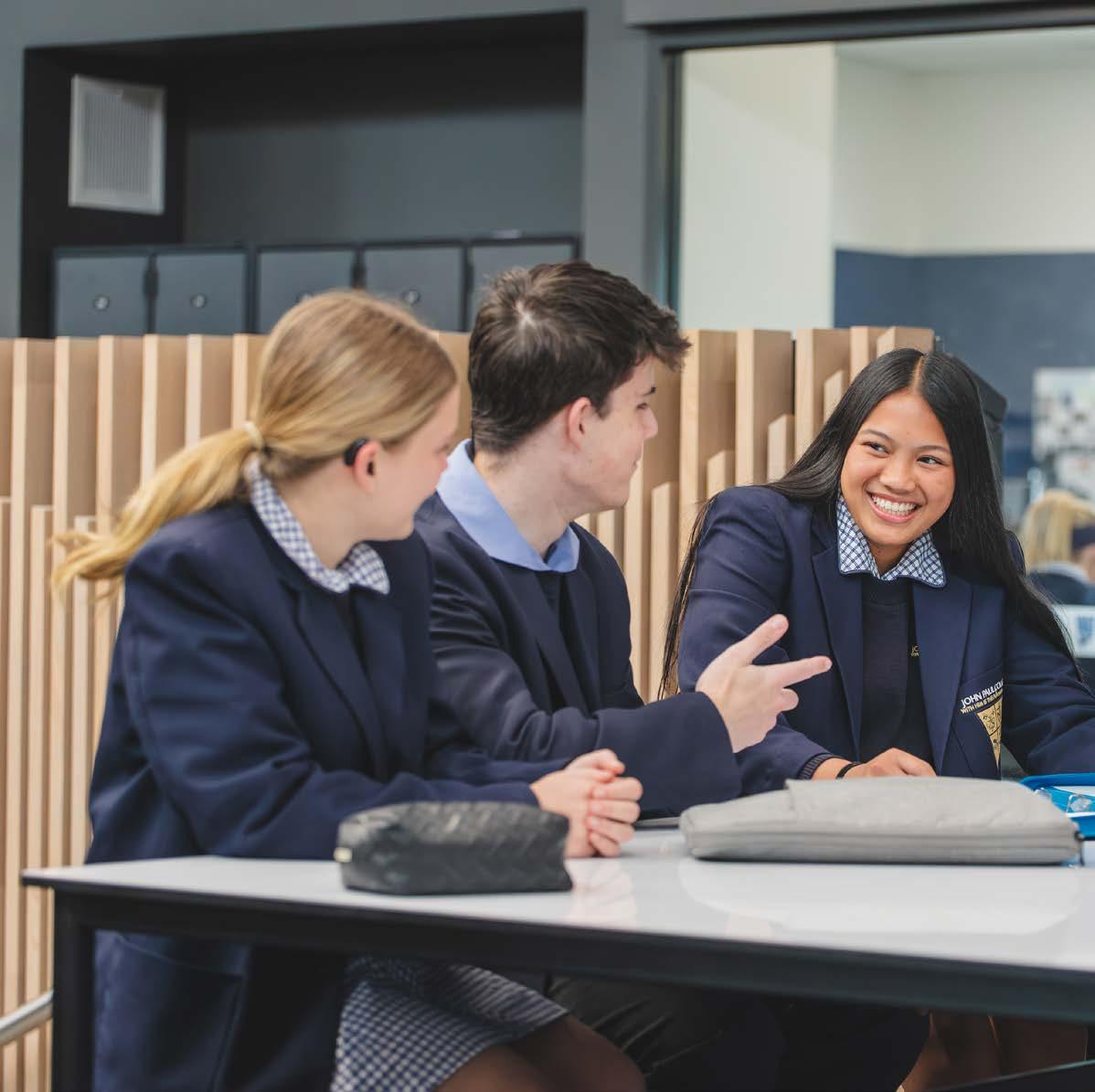


Contacts
VCE FAQs
Academic Extension Activities
Pick Your Path
Accelerate Your Studies
Year 10 Subject Pathways
Year 11 &12 Subject Pathways
Learning Areas

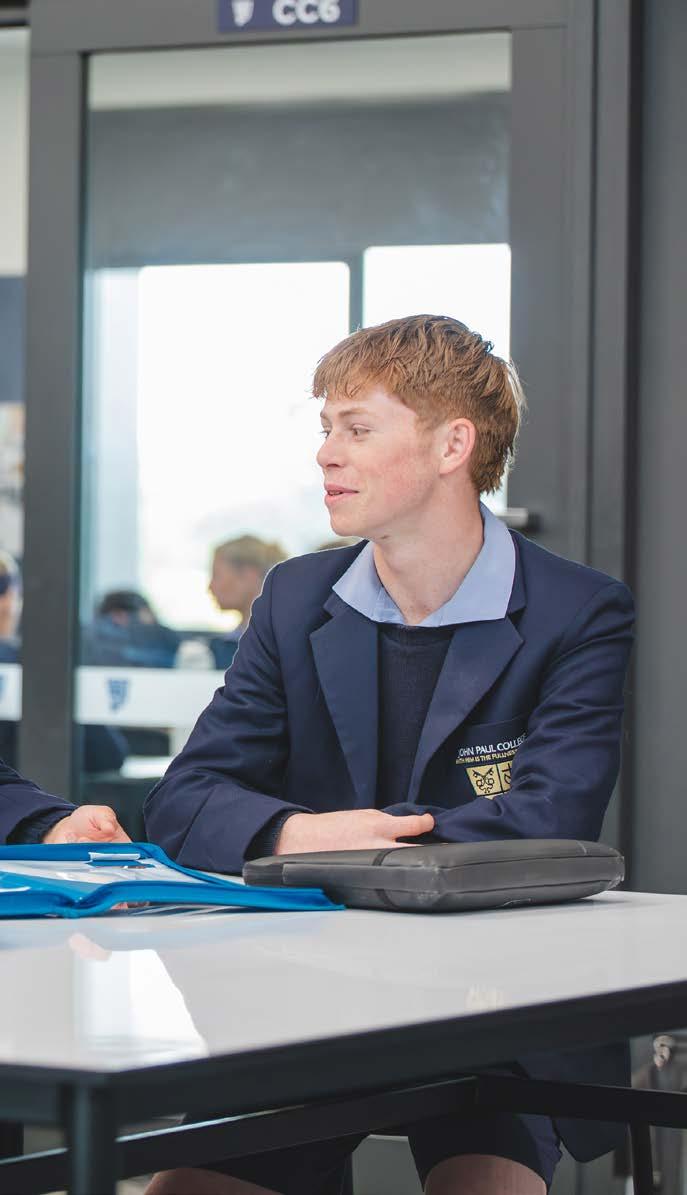
Welcome to the 2025 Senior School Curriculum Guide for Years 10 to 12. This guide outlines the curriculum and pathway options available to students as they transition into the final stage of their learning journey at John Paul College.
The senior years are a time of increasing choice and personal responsibility. Our goal is to empower students to design a pathway that aligns with their strengths, interests and post-school aspirations, whether those include tertiary education, training or employment.
We remain committed to explicit instruction as the foundation of our practice, consistent with the MACS Vision for Instruction. Our teachers focus on delivering structured, evidence-based learning that challenges students, builds confidence and supports achievement.
Students at this stage are encouraged to reflect on their learning journey, engage meaningfully with their studies and take ownership of their goals. We offer a range of VCE, VCE Vocational Major (VCE VM), VET and Victorian Pathways Certificate (VPC) options that recognise the diverse talents and ambitions of our students.
This is also a time for students to build the personal capabilities such as leadership, resilience and selfregulation that will prepare them for life beyond school. Through a supportive and inclusive learning environment, we aim to foster independence while maintaining a strong sense of connection to the John Paul College community.
We look forward to walking alongside every student as they shape their future with confidence, purpose and integrity.
Mr Michael O’Keeffe Deputy Principal – Learning and Teaching
For subject specific information, please contact the student’s relevant subject teacher. For wellbeing support, please contact the student’s Pastoral Group Teacher or Senior Wellbeing Leader.
For pathway and career advice, please contact JPC Careers at careerhub@jpc.vic.edu.au

Tom Senior Head of Senior School – Learning seniorto@jpc.vic.edu.au

Peter Molan Head of Senior School – Wellbeing peter.molan@jpc.vic.edu.au
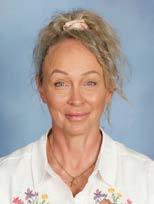
Janine Cavanagh VCE-VM Learning Area Leader janine.cavanagh@jpc.vic.edu.au
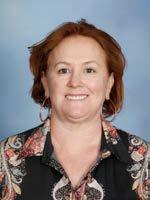
Donna Matthews VET Coordinator matthewd@jpc.vic.edu.au

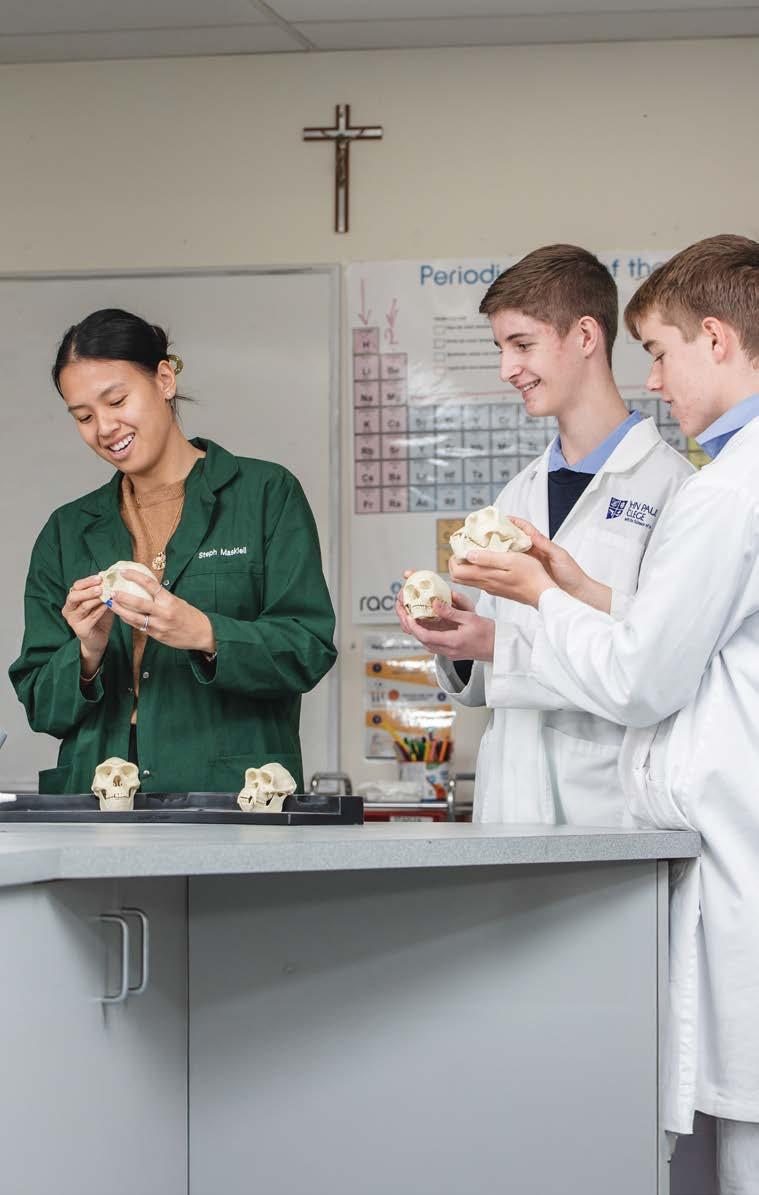
When choosing subjects, think about what interests you and where your strengths lie. Reflect on your experiences from Years 7–9, extracurricular activities, and life beyond school to help guide your decisions and build a meaningful learning pathway. We recommend that students keep in mind the following:
▪ Choose subjects that you enjoy. This helps you to remain motivated and to learn in the best way.
▪ At Years 11 and 12 choose subjects that are prerequisites for your chosen field of study or work. You are encouraged to see our Careers Advisor to help with this.
If you’re unsure about future pathways, choose a broad mix of subjects to keep your options open. Avoid limiting yourself to one area. Every student will have the opportunity of a meeting with the College Careers Advisor for guidance on subject selection and tertiary planning. It’s also important to speak with VCE subject teachers to ensure your choices align with your future goals.
We do our best to give every student their preferred subjects. However, if a subject doesn’t run due to low numbers or if there is a clash in your timetable, we’ll talk with you about alternatives. The VCE timetable is built from student choices, but sometimes clashes happen. If they do, you may need to reselect a subject. We’ll work with you to ensure you get the subjects that suit your interests, strengths, and future goals.
The Victoria Curriculum and Assessment Authority (VCAA) website includes a wealth of information, including Study Designs for each subject, Past Exams and Examination Reports, and information on how Study Scores are calculated.
We encourage you to explore the resources available here www.vcaa.vic.edu.au/Pages/HomePage.aspx
We offer a wide range of enrichment programs designed to challenge and inspire you.
Using tools like the Progressive Achievement Test (PAT), scholarship testing, and teacher recommendations, we identify students with strong academic potential and invite them to take part in extension opportunities.
Weekly Maths Extension classes, Gifted and Talented Enrichment programs, national and global academic competitions allow you to explore big ideas and solve complex problems.
These programs can include but are not limited to:
▪ Gifted and Talented Enrichment classes (Year 7 & 8)
▪ Global Academic Challenge
▪ Tournament of the Minds
▪ Debating and Public Speaking Competitions
▪ Science Talent Quest
▪ Mathematics
▪ Math’s Extension Classes
▪ Australian Mathematics Competition
▪ Maths Talent Quest
▪ University of New South Wales Mathematics Challenge
▪ Humanities
▪ Australian Geography Competition
▪ Australian History Competition
▪ National History Challenge
▪ Simpson Prize
▪ ASX Game
▪ Model UN Competition
▪ Victorian Parliament Prize
6 John Paul College

The Victorian Certificate of Education (VCE) is the official qualification you receive when you successfully complete your secondary schooling. It’s recognised across Australia and opens up a range of pathways whether you’re aiming for university, TAFE, or heading straight into the workforce.
Each subject you take in the VCE is called a “study,” and it’s made up of four parts, known as Units 1, 2, 3, and 4. You’ll usually complete Units 1 and 2 in Year 11, and Units 3 and 4 in Year 12.
We believe that the best approach to subject selection is one that takes into account individual interests and abilities.
▪ Choose subjects that you have aptitude for and enjoy.
▪ At Years 11 and 12 choose subjects that are prerequisites for your chosen field of study or work. You are encouraged to see our Careers Advisor for assistance.
The VCE Vocational Major (VCE VM) is a recognised senior secondary qualification within the VCE, designed for students who are interested in combining classroom learning with practical, handson experience.
VCE VM supports you to prepare for future pathways including apprenticeships, traineeships, TAFE, or entry into the workforce. It includes core studies in Literacy, Numeracy, Work-Related Skills and Personal Development Skills, alongside one or more VET (Vocational Education and Training) courses.
This pathway is ideal for students who enjoy applied learning, want to build employability skills, and are ready to engage with real-world experiences. You’ll have the chance to complete structured workplace learning, explore industry options, and develop valuable skills for life beyond school.
As with all pathways, we encourage you to consider your interests, strengths, and long-term goals when making subject selections.
VET programs are nationally recognised certificate courses that give you the chance to combine hands-on vocational training with your regular studies in Year 10, VCE, or VCE VM. It’s a great way to explore your interests, build real-world skills, and get a taste of the career you might want to pursue.
You can choose a VET course run onsite at JPC during school hours, or you might prefer to enrol in a course through a TAFE provider. If you’re doing VCE VM, your TAFE course can be part of your weekly schedule. If you’re in the VCE stream, you can still take a VET course after school hours.
VET programs count towards your VCE or VCE VM in different ways. For VCE, they can contribute as unscored units or even as scored assessments with an exam and study score. For VCE VM, they help you meet the Industry Specific Skills requirement.
Note: families are responsible for the extra costs involved in VET courses.
The Victorian Pathways Certificate VPC is a flexible and inclusive Year 11–12 certificate designed for students who benefit from a more personalised learning program. It supports students in building the skills, knowledge, and confidence needed for work, further study, and life beyond school.
The VPC can be a final qualification or a stepping stone to the VCE, VCE Vocational Major (VM), or a VET course. It focuses on four key areas: Literacy, Numeracy, Work-Related Skills, and Personal Development Skills.
Students engage in hands-on learning, industry experiences, and community involvement. The program supports those who may have faced challenges in their education, offering a supportive environment to succeed.
While it doesn’t provide credit into the VCE or VCE VM, the VPC helps students stay engaged in their learning, build strong foundations and make informed choices about their future pathways.
▪ ATAR
▪ SAC/SAT
▪ GAT/Exams
▪ Optional VET
▪ VCE Certificate
▪ Access to University & TAFE
▪ SAC’s
▪ GAT
▪ VET (Onsite or Offsite)
▪ Pathway to further study, University, TAFE or employment
▪ VCE Certificate
▪ Delivered in partnership with an RTO ie. TAFE
▪ Certificate III
▪ Scored VET contributes to ATAR
▪ Access to University & TAFE
▪ VCE Certificate
▪ VET programs have a Unit 1–4 structure
▪ Victorian Pathways Certificate
▪ Pathway to further study, vocational training or employment
▪ Flexible learning and assessment
If you consistently achieve high academic results and demonstrate excellent learning skills and work habits, you may be eligible to accelerate your studies. Here’s how it works:
▪ Year 10: You can start studying a VCE Unit 1 and 2.
▪ Year 11: You can take on a VCE Unit 3 and 4 subject.
▪ Year 12: You have the opportunity to study a University Extension subject. To be considered for acceleration, you need to submit an application form by the specified due date – the Head of Senior School - Learning can help with this
For those enrolled in a three-year VCE program, you are expected to complete six VCE Unit 3 and 4 sequences. This typically involves studying one VCE Unit 3 and 4 sequence in Year 11 and five VCE Unit 3 and 4 sequences in Year 12.
This approach allows you to gain an additional 10% of the scaled score from your sixth study, which can be used in the calculation of your Australian Tertiary Admissions Rank (ATAR).
If you’re a high-achieving Year 11 student who has already completed one or more VCE Unit 3 and 4 sequences, you might be interested in applying to study a University Extension subject in Year 12. However, please note that approval for studying an extension subject is granted only in exceptional circumstances. The decision will be made by the Head of Senior School Learning.

Scan QR code to view the Learning and Teaching policies on the College website
THE FOLLOWING VCE UNIT 1 & 2 SUBJECTS ARE AVAILABLE FOR ACCELERATION IN YEAR 10:
• Visual Communication Design
• General Mathematics (Units 3&4 only)
• Biology
• Psychology
• Food Studies
• Applied Computing
• Product Design
• Health and Human Development
• VET Dance
• Victorian Pathways Certificate (VPC)
• Physical Education
• Business Management
• History
8 John Paul College

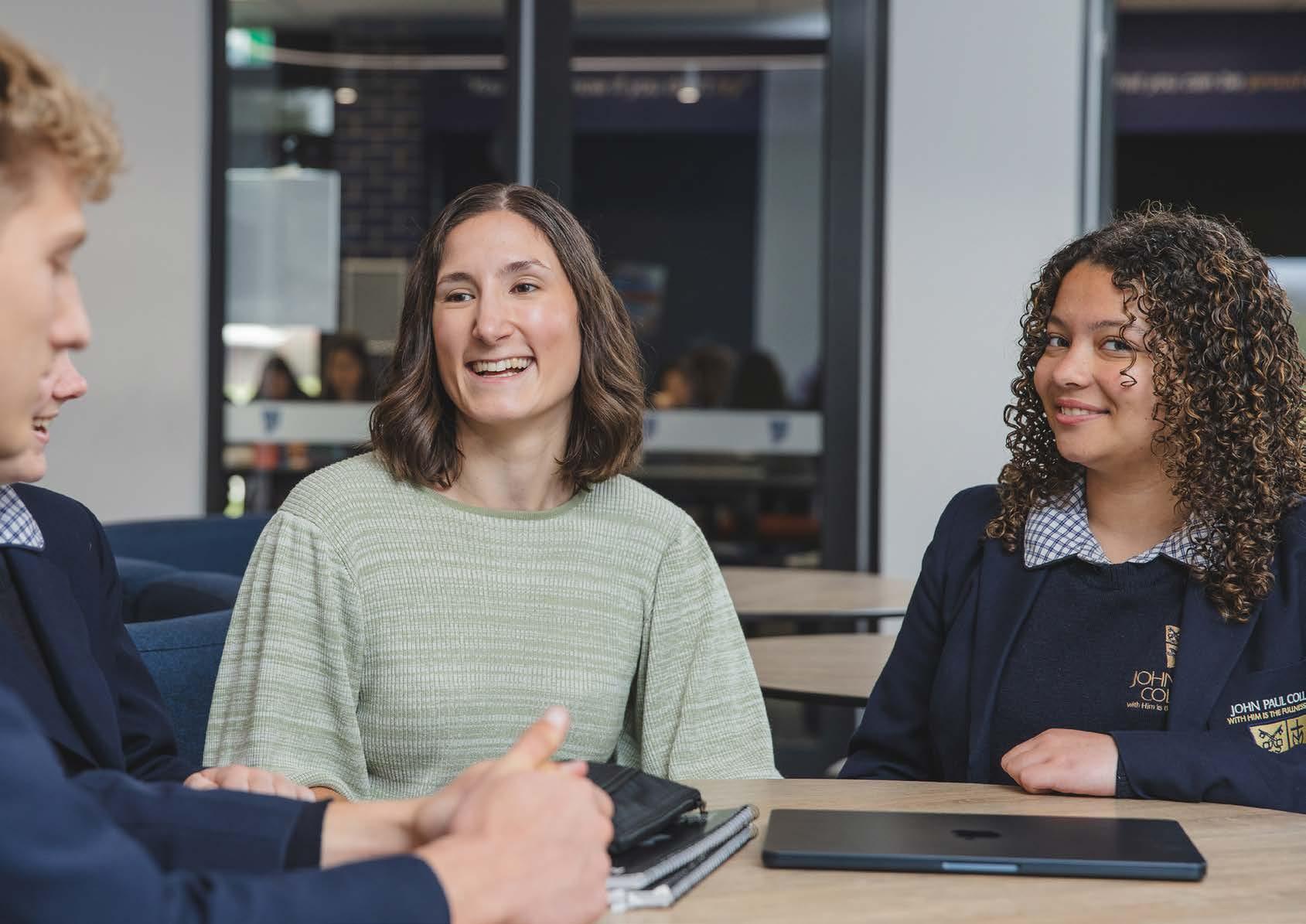
Year 10 students have the opportunity to study a number of elective subjects, (including VET courses), in addition to the core subjects.
Students who consistently achieve high academic results and demonstrate excellent work habits may be approved to study a VCE Unit 1 and 2 course in Year 10.
Students are required to select 4 elective units and can include an accelerated VCE Unit 1 & 2 subject.
English & Language English
Health & Physical Education Health
Mathematics
Student are required to select one of the following
John Paul College
Science
Students are required to select a minimum of one
Foundation Mathematics* Mathematics*
Advanced Mathematics*
Religious Education VCE Religion and Society Units 1 & 2
English & Language English Language Literature*
Italian (Year Long)
Health & Physical Education
Humanities
Students are required to select a minimum of one
Exercise Science
Health & Human Development
Outdoor Education
Accounting
Business Management
Economics
Geography: Epic Earth
Geography: Human Horizons
History: Death and Disease
History: Empires of the Ancients
Legal Studies
Politics
Technology
Astronomy
Biology
Chemistry
Earth & Environmental Science
Physics
Psychology
Advanced Food Studies
Digital Technologies
Food Around the World
Product Design & Technology
Systems Engineering
Textiles
Performing Arts Dance
Drama
Music
Visual Arts Art
Media Arts: Photography
Media Arts: Filmmaking
Visual Communication Design
Year 11 Electives: Students are required to select 5 units.
Year 12 Electives: Students are required to select 4 VCE units (3 VCE Subjects for students studying VCE Religion and Society Units 3 & 4)
YEAR LONG SUBJECTS
English & Language Italian
English Language
Health & Physical Education
Health & Human Development
Outdoor & Environmental
Studies
Physical Education
VET Allied Health Assistance
VET Sports & Recreation
Humanities Accounting
Ancient History
Business Management
Economics
Geography
History
Legal Studies
YEAR LONG SUBJECTS
English & Language
Students are required to select a minimum of one English Literature
Religious Education
Students are required to select a minimum of one
ACU & CSYMA Youth
Academy2 year program
Religion & Society
School Based Religious Education
Text & Traditions
Mathematics
Politics
Sociology
VET Business
General Mathematics
Mathematical Methods
Specialist Mathematics
Performing Arts Drama
Music Contemporary Performance
VET Dance
Science Biology
Chemistry
Earth & Environmental Science
Physics
Psychology
Visual Arts Art Making and Exhibiting
Media
Visual Communication Design
Technology Applied Computing
Data Analytics
Food Studies
Product Design & Technology
Software Development
Systems Engineering
VET Horticulture
Applied Learning Literacy Skills
Numeracy Skills
Personal Development Skills
Work Related Skills
Structured Workplace Learning
VET Community Services
(Religious Education)
Vocational Education &
Training (offsite or onsite)

7 Year 8 Year 9 Year 10 Year 11 Year 12
YEAR LONG CORE SUBJECT
Explore how stories and films break the rules and challenge what we expect!
You’ll dive into texts and movies to see how authors and filmmakers use structure, language, and images to create meaning and convey their messages.
Discover the hidden values and beliefs in these works and understand how they’re shaped by the purpose and audience.
Get ready to uncover the secrets behind powerful storytelling and filmmaking!
SEMESTER BASED ELECTIVE
In Year 10, you’ll explore linguistic elements from VCE English Language studies. You’ll examine how language helps us understand experiences and interact with others, its functions, and its complex system of signs and conventions.
The unit covers the relationship between speech and writing, the influence of context on language choices, and how children acquire language.
► Your pathway to VCE English Language
SEMESTER BASED ELECTIVE
In this subject, you’ll explore various text types and writing styles to prepare for VCE Literature. You’ll engage in discussions about the historical context and language of the texts, examining the views and values embedded within them.
Through this process, you’ll develop skills in interpreting and analysing texts, as well as responding both analytically and creatively.
This will help you understand different approaches to literature and literary perspectives, setting a strong foundation for your future studies in VCE Literature.
► Your pathway to VCE Literature
YEAR LONG ELECTIVE
You’ll strengthen your understanding of linguistic systems by giving presentations and answering various questions. You’ll interpret information and attitudes in different texts, both informational and imaginative.
You’ll also create written pieces like descriptions, narratives, and recounts that express experiences, ideas, and emotions. Additionally, you’ll reflect on how language and culture create meanings and how your own linguistic and cultural assumptions influence your use and learning of Italian.
Studying Italian not only opens the door to a rich heritage, but also sharpens your cognitive flexibility, enhances problemsolving skills, and boosts future career opportunities in an increasingly globalised world. Whether you’re interested in travel, international relations, fashion or business, learning Italian connects you with one of the world’s most influential cultures and economies.
► Your pathway to VCE Italian
Unit 1
You’ll dive into stories and texts that spark personal connections. You’ll explore what makes writing powerful, build your own writing folio, and reflect on how your ideas take shape. It’s all about discovering your voice and learning how to express it with confidence.
Unit 2
You’ll take your analysis further, unpacking how authors use structure, language, and style to create meaning. You’ll also explore how persuasive texts are crafted to influence audiences, and you’ll get the chance to present your own point of view on a current issue in a spoken presentation.
Areas of Study
▪ Reading and exploring texts
▪ Crafting texts
▪ Exploring Argument
Unit 3
You’ll explore the big ideas, values, and concerns that authors weave into their stories. You’ll also create your own pieces of writing, crafted for a specific audience, purpose, and context and reflect on the choices you made as a writer.
Unit 4
You’ll take your analysis to the next level, digging into both the obvious and hidden messages in texts. You’ll also examine how persuasive language and argument are used to influence audiences, and you’ll develop and deliver your own oral presentation on a current issue that matters to you.
These units are all about thinking critically, writing with purpose, and speaking with confidence. You’ll grow as a communicator and learn how to express your ideas in powerful, meaningful ways.
Areas of Study
▪ Reading and exploring texts
▪ Crafting texts
▪ Analysing Argument
Unit 1 & 2
▪ Teachers’ decision that students have demonstrated achievement of a set of VCAA specified outcomes.
Unit 3 & 4
▪ School-assessed coursework: 50%
▪ Written examination: 50%
Language helps us make sense of the world and communicate with others. In this unit, you’ll explore how language is structured and used in different situations. You’ll learn how speech and writing work together, and how context affects your language choices.
We’ll also look at how children learn to speak and understand language, exploring the stages of language development and key subsystems like grammar and vocabulary.
You’ll build your own skills too - improving punctuation, sentence structure, and comprehension. These activities link directly to your English class, such as learning to punctuate dialogue for creative writing tasks.
Areas of Study
▪ The nature and functions of language
▪ Language acquisition
In this unit, you’ll explore how and why the English language changes over time. You’ll examine the factors that influence language evolution and how English has spread globally. By studying texts from the past and present, you’ll see how changes affect different parts of language like sounds, grammar, vocabulary, and meaning.
You’ll also learn how people’s attitudes toward language change can vary, and how English has developed into many different varieties around the world. We’ll explore how contact with other languages has shaped English and impacted Indigenous languages.
By the end of the unit, you’ll understand how English continues to evolve and how language reflects culture, identity, and global communication.
Areas of Study
▪ English across time
▪ Englishes in contact
Unit 1 & 2
▪ Teachers’ decision that students have demonstrated achievement of a set of VCAA specified outcomes
Unit 3 & 4
VCE English Language - Units 3 & 4 to be offered in 2027
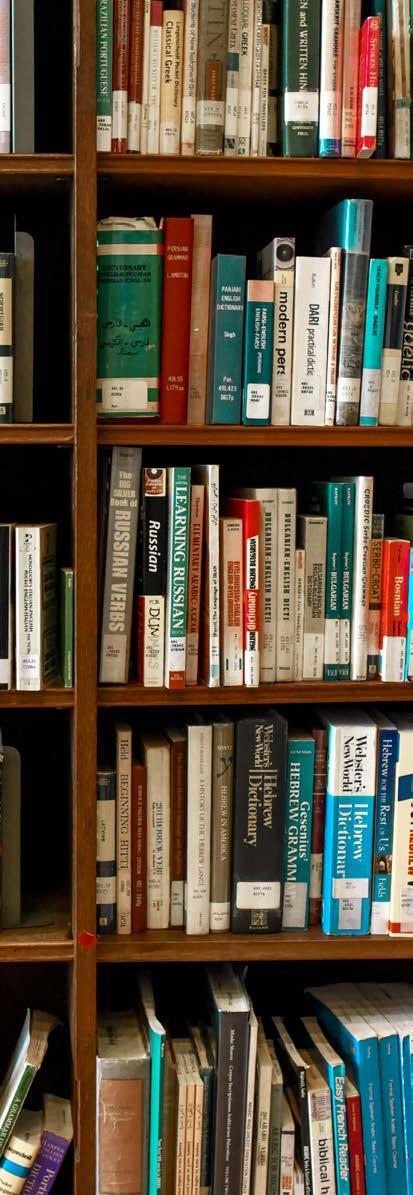

Unit
Explore a range of literary texts from novels, plays, poems, and more and explore the big ideas, styles, and storytelling techniques that define different genres and literary movements. You’ll learn how to analyse texts closely and make personal connections with the characters, themes, and messages.
Unit 2
Consider the powerful voices and perspectives of Aboriginal and Torres Strait Islander authors and creators. You’ll reflect on how their stories are shaped by culture, history, and community and how they speak to the world around us. You’ll also look at how texts reflect the values and concerns of the time and place they were created in.
These units are all about discovering how stories shape our understanding of people, culture, and identity, and how your own voice fits into that bigger picture.
▪ Reading practices
▪ Exploration of literary movements and genres
▪ Voices of Country
▪ The text in its context
Explore how stories change when they’re told in different forms like comparing a novel with its film adaptation. You’ll look at how meaning shifts between page and screen, and develop your own interpretation of a set text, using both the author’s ideas and a related reading to support your view. You’ll also create your own writing, crafted for a specific audience and purpose, and explain the choices you made along the way.
Unit 4
You’ll respond to a text with your own imaginative piece, then reflect on how your writing connects with the original. You’ll also dive deep into a text’s language, structure, and style to build a strong, thoughtful interpretation.
These units are all about thinking critically, writing creatively, and expressing your ideas with clarity and confidence.
▪ Adaptations and transformations
▪ Developing interpretations
▪ Creative responses to texts
▪ Close analysis of texts
Students entering Unit 3 without Units 1 and/or 2 will be required to attend a College Pathways Meeting and undertake additional preparation as prescribed by their teacher.
Students must undertake Unit 3 and Unit 4 as a sequence. ASSESSMENT
Unit 1 & 2
▪ Teachers’ decision that students have demonstrated achievement of a set of VCAA specified outcomes. Unit 3 & 4
▪ School-assessed coursework: 50%
▪ Written examination: 50%
Unit 1
Explore Italian language and culture through engaging topics like food, fashion, music, festivals, and film. Build your vocabulary and grammar while learning to communicate effectively in Italian. Each subtopic introduces cultural products, stories, songs, artworks, and traditions that reflect the values and perspectives of Italianspeaking communities. You’ll also reflect on how language and culture shape communication in different contexts.
Deepen your understanding of how language and culture are connected. Continue developing your Italian skills while exploring diverse topics through an Italian lens. Analyse spoken, written, and visual texts to see how meaning is influenced by cultural context. From everyday traditions to creative expressions, you’ll examine how cultural products reveal different worldviews. You’ll also reflect on how your own background shapes your understanding and use of language, and how audience and context affect communication.
Discover how Italian speakers express ideas, persuade, and share perspectives. Through diverse topics, you’ll expand your vocabulary and grammar while learning to interpret information, form opinions, and craft persuasive arguments in Italian. You’ll explore how meaning is shaped by language and culture in spoken, written, and visual texts, and reflect on how Italian is used across different contexts and audiences. This unit also highlights how learning Italian can support travel, study, work, and community engagement.
Strengthen your Italian skills while exploring how culture influences thought, communication, and daily life. Each subtopic offers insight into Italianspeaking communities, from traditions and values to everyday experiences. You’ll analyse texts, images, and conversations to understand how culture is expressed through language. By comparing your own experiences with what you learn, you’ll gain a deeper appreciation for diverse perspectives. Studying cultural products like food, fashion, festivals, and art will reveal how beliefs, time, and place shape behaviour.
1. The Individual
▪ Personal Identify and Lifestyles
▪ Relationships
▪ Education and Future Aspirations
2. The Italian-Speaking Communities
▪ The Italian Cultural Heritage
▪ Historical and Contemporary People and Events
▪ Living in an Italian Community
3. The World Around Us
▪ Global and Contemporary Society
▪ Communication and Media
▪ The Influence of Science and Technology
There are no prerequisites for entry to Units 1, 2 and 3. Students must undertake Unit 3 and Unit 4 as a sequence. Units 1 to 4 are designed to a standard equivalent to the final two years of secondary education. All VCE studies are benchmarked against comparable national and international curricula. VCE Italian is designed for students who have typically studied the language for at least 200 hours prior to the commencement of Unit 1.
Unit 1 & 2
▪ Teachers’ decision that students have demonstrated achievement of a set of VCAA specified outcomes. Unit 3 & 4
▪ School-assessed coursework: 50%
▪ Oral examination: 12.5%
▪ Written examination: 37.5%
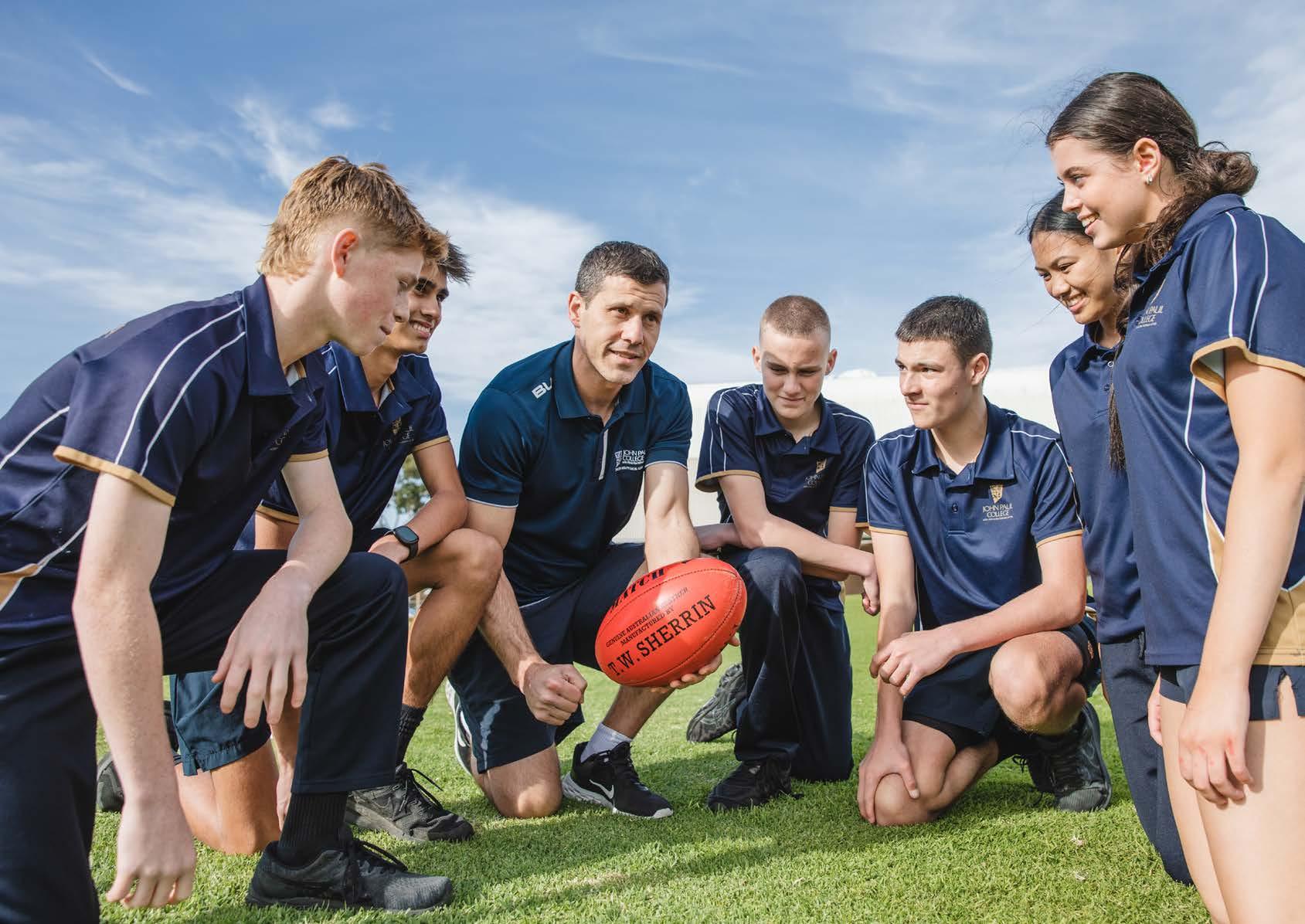
YEAR 10
YEAR LONG CORE SUBJECT
Gain essential knowledge and skills to manage relationships, advocate for health, and ensure safety. You’ll dive into the different aspects of health—physical, emotional, mental, social, and spiritual.
You’ll explore road safety, respectful relationships, harm minimisation, mental health, and sexual health. Learn about road mortality, driving dangers, genderbased violence, drug effects, mindfulness, and reproductive health.
This subject empowers you with life skills to make informed decisions and promote healthier communities.
YEAR 10
SEMESTER BASED ELECTIVE
Discover the importance of regular physical exercise for boosting your physical and social well-being. You’ll dive into activities like weights, interval, circuit, and aerobic training, along with team sports and individual pursuits.
You’ll explore fitness components, set personal goals, design fitness programs, and analyse how your body adapts to training.
Key concepts include understanding fitness components, training methods, and body systems.
► Your pathway to VCE Physical Education or VCE VET Sport and Rec.
YEAR 10
SEMESTER BASED ELECTIVE
This subject equips you with essential skills like research, analysis, and critical inquiry. You’ll explore the World Health Organisation’s definition of health and wellbeing, understanding how biological, sociocultural, and environmental factors shape these dynamic concepts.
Dive into the five dimensions of health, study lifespan development, and learn about the stages of human life. This subject empowers you to make informed decisions for your wellbeing and others.
► Your pathway to VCE Health and Human Development or VCE VET Sport and Rec.
YEAR 10
SEMESTER BASED ELECTIVE
This is an exciting subject that immerses you in practical experiences, connecting you with nature, others, and yourself. You’ll dive into activities like rock climbing, bushwalking, and first aid training, developing essential skills in bush safety, communication, teamwork, and leadership.
The curriculum emphasises positive relationships with the environment, engaging in navigation and orienteering exercises , promoting sustainability and well-being.
► Your pathway to VCE Outdoor and Environmental Studies.
Unit 1
Explore what health and wellbeing mean from different perspectives, including the World Health Organization’s definition. You’ll learn that health is more than just the absence of illness, it’s shaped by personal, cultural, and social factors. You’ll reflect on your own views and explore how different communities, including Aboriginal and Torres Strait Islander peoples, understand and experience health. You’ll also look at the dimensions of health, what influences them, and how we measure health in young people today.
Unit 2
This unit focuses on how health and development change across the lifespan, especially from youth to adulthood. You’ll explore how people grow physically, emotionally, and socially, and how these changes affect health. You’ll also learn about the Australian healthcare system, how it works, who it supports, and how digital media is changing the way we access health information. You’ll think critically about health data, quality of care, and how to make informed decisions. By the end of this unit, you’ll have stronger health literacy and a better understanding of how to support your own wellbeing and that of others.
▪ Concepts of health
▪ Youth health and wellbeing
▪ Health and nutrition
▪ Developmental transitions
▪ Youth health literacy
Unit 3
Examine health, wellbeing, and illness from a global perspective. You’ll learn how health is a basic human right and examine how the World Health Organization works to improve health worldwide. You’ll compare health outcomes between countries and look at how factors like income, education, and access to healthcare create differences in wellbeing. You’ll also explore public health strategies and how they aim to reduce health inequalities.
This unit focuses on global health and human development. You’ll investigate how global issues like climate change, conflict, and poverty affect people’s health and quality of life. You’ll study the United Nations’ Sustainable Development Goals and how they aim to create a healthier, fairer world. You’ll also reflect on how you can contribute to global health action. By the end of this unit, you’ll have a deeper understanding of how health is shaped by global forces and how we can work together to improve it.
▪ Understanding health and wellbeing
▪ Promoting health in Australia
▪ Global health and human development
▪ Health and the Sustainable Development Goals
There are no prerequisites for entry to Units 1 & 2. Students must undertake Unit 3 & 4 as a sequence. Students entering Units 3 & 4 would benefit from familiarising themselves with the foundational concepts of health introduced in Unit 1 – Understanding Health and Wellbeing.
ASSESSMENT
Unit 1 & 2
▪ Teachers’ decision that students have demonstrated achievement of a set of VCAA specified outcomes.
Unit 3 & 4
▪ School-assessed coursework: 50%
▪ Written examination: 50%
Study how your body moves by learning about the musculoskeletal and cardiorespiratory systems. You’ll discover how these systems work together to produce movement and how they adapt during physical activity. You’ll also look at how social, cultural, and environmental factors influence participation in physical activity and learn how to reduce the risk of injury.
You’ll shift from just learning about movement to thinking about how and why people are active. By exploring different types of physical activity and their benefits, you’ll understand what’s needed to stay healthy and active across different age groups and communities. You’ll investigate what helps or gets in the way of people being active and come up with strategies to make physical activity more inclusive and accessible.
Using models like the Social-Ecological Model and the Youth Physical Activity Promotion Model, you’ll evaluate how effective different strategies are in encouraging regular activity. This unit will help you build the knowledge and skills to make informed choices about your own health and support others in leading active, healthy lives.
Areas of Study
▪ How does the musculoskeletal system work to produce movement?
▪ What role does the cardiorespiratory system play in movement?
▪ How do physical activity, sport and exercise contribute to healthy lifestyles?
▪ What are the contemporary issues associated with physical activity and sport?
Consider how the body moves and performs during physical activity, sport, and exercise. You’ll explore how biomechanics and skill acquisition help us understand and improve movement. You’ll also learn how the body produces energy, how the three energy systems work together, and what causes fatigue. Plus, you’ll look at recovery strategies that help athletes bounce back faster. You’ll analyse movement from different angles, physiological, psychological, and sociocultural and apply training principles to improve performance. You’ll design, take part in, and evaluate training programs, learning how to tailor them to different goals and fitness levels. You’ll also explore how the body adapts to long-term training and how to measure those changes.
By the end of these units, you’ll have the knowledge and tools to boost your own performance and understand what it takes to train like an athlete. Whether you’re into sport, fitness, or just want to know how your body works, these units will help you make informed, healthy choices.
▪ How are movement skills improved?
▪ How does the body produce energy?
▪ What are the foundations of an effective training program?
▪ How is training implemented effectively to improve fitness?
▪ Integrated movement experiences
There are no prerequisites for entry to Units 1 & 2. Students must undertake Unit 3 & 4 as a sequence.
Unit 1 & 2
▪ Teachers’ decision that students have demonstrated achievement of a set of VCAA specified outcomes.
Unit 3 & 4
▪ School-assessed coursework: 50%
▪ Written examination: 50%
Unit 1
Consider how people, both Indigenous and nonIndigenous, connect with and understand nature through outdoor experiences. You’ll reflect on your own per-sonal responses to being in outdoor environments and learn how different cultures and communities relate to the natural world.
Unit 2
Focusing on how humans impact outdoor environments and how we can better care for them, you’ll study real-life examples of natural changes and human activities, like land management, and how they affect the sustainability of outdoor spaces. You’ll also learn practical skills to reduce your impact on the environment and explore different career paths that involve working with nature.
Throughout both units, you’ll compare different outdoor environments and think about how people’s motivations, values, and access to nature shape their experiences. You’ll also explore how your own experiences influence the way you see and interact with the environment. By spending time outdoors and reflecting on what you learn, you’ll build the knowledge and skills to enjoy and protect natural places now and in the future.
▪ Our place in outdoor environments
▪ Exploring outdoor environment
▪ Safe and sustainable participation in outdoor experiences
▪ Understanding outdoor environments
▪ Observing impacts on outdoor environments
▪ Independent participation in outdoor environments
Explore how people have connected with Australian outdoor environments for over 60,000 years. You’ll learn about the ecological, historical, and social factors that shape our relationships with nature, including the deep knowledge and practices of First Nations peoples.
Through case studies and hands-on experiences, you’ll investigate how different groups use and manage outdoor environments. You’ll look at the impact of human activity and explore strategies for sustainable management. You’ll also carry out your own research into the health and importance of specific environments, thinking about how to balance human needs with environmental protection.
You’ll build practical skills and reflect on your experiences outdoors to better understand how communities can take action to protect the environment. By the end of these units, you’ll be able to suggest real solutions to environmental challenges and understand how your actions can make a difference.
▪ Changing human relationships with outdoor environments
▪ Relationships with Australian environments in the past decade
▪ The importance of healthy outdoor environments
▪ The future of outdoor environments
▪ Investigating outdoor environments
There are no prerequisites for entry to Units 1 & 2. Students must undertake Unit 3 & 4 as a sequence.
ASSESSMENT
Unit 1 & 2
▪ Teachers’ decision that students have demonstrated achievement of a set of VCAA specified outcomes.
Unit 3 & 4
▪ School-assessed coursework: 50%
▪ Written examination: 50%

MANAGEMENT
GEOGRAPHY: EPIC EARTH
GEOGRAPHY:
HISTORY: EMPIRES OF THE ANCIENTS
YEAR 10
SEMESTER BASED ELECTIVE
Dive into the fascinating histories of ancient Greece and Rome, exploring their political systems, social structures, and cultural achievements.
You’ll develop skills in interpreting and analysing primary and secondary sources, constructing strong historical arguments, and evaluating evidence. Investigate key events and influential figures to understand how these civilizations were governed.
Explore how art, architecture, literature, and philosophy from these societies have shaped modern culture.
This subject connects ancient civilizations to today’s world, highlighting their lasting legacy.
► Your pathway to VCE Sociology, VCE History and VCE Ancient History.
YEAR 10
SEMESTER BASED ELECTIVE
Investigate how major outbreaks shaped societies, changed medical thinking, and influenced how people view death and burial.
Using real historical sources, from ancient texts to modern accounts, you’ll explore how different cultures responded to illness and loss, and compare beliefs and practices across time.
It’s a powerful look at how humanity has faced its biggest challenges and how those moments still shape our world today.
► Your pathway to VCE Sociology, VCE History and VCE Ancient History.
YEAR 10
SEMESTER BASED ELECTIVE
Explore how people, places, and environments shape each other, focusing on human wellbeing across the globe.
You’ll investigate why wellbeing varies, looking at factors like health, education, and income, and use real data to map and measure development.
Through fieldwork and case studies, you’ll see how geography connects to realworld challenges, evaluate global efforts to improve lives, and sharpen your skills in analysis, inquiry, and argument. It’s all about understanding our world and your place in it.
► Your pathway to VCE Geography.
YEAR 10
SEMESTER BASED ELECTIVE
Explore Earth’s epic story, its wild landscapes, natural wonders, and the forces that shape our environment. Through hands-on activities, fieldwork, and real-world case studies, you’ll investigate how landforms, water, climate, and people interact.
You’ll look at big issues like natural disasters, climate change, and human impact, and discover what sustainability really means.
Along the way, you’ll build skills in mapping, data analysis, and problem-solving, becoming a globally aware thinker ready to take on the environmental challenges of today and tomorrow.
► Your pathway to VCE Geography

YEAR 10
SEMESTER BASED ELECTIVE
Discover how decisions are made about using resources to meet our needs and wants.
You’ll explore how goods and services are produced, how money works, and why things like inflation, unemployment, and global trade matter.
Learn how supply and demand affect prices, why governments get involved in markets, and how financial systems impact our daily lives.
By unpacking key concepts and realworld issues, you’ll build the skills to think critically about Australia’s economy and your role in it.
► Your pathway to VCE Economics.
YEAR 10
SEMESTER BASED ELECTIVE
This subject introduces you to the basics of accounting and how it’s used in the business world. You’ll learn how to record, organise, and understand financial information, and how businesses use this data to make smart decisions. You’ll also explore how digital tools and accounting software are used in real workplaces.
Through hands-on activities and realworld examples, you’ll practise managing financial records and interpreting reports. You’ll see how accounting supports planning, budgeting, and tracking business performance.
You’ll also explore how accounting fits into different business settings and why it’s such an important skill in today’s world. By the end of the course, you’ll have a strong foundation for further study in Accounting, Business, or Economics.
► Your pathway to VCE Accounting.
SEMESTER BASED ELECTIVE
In this subject, you’ll explore how innovation and entrepreneurship drive business success. You’ll learn how the way we work and do business is changing in Australia and around the world. You’ll also look at how businesses are becoming more socially and environmentally responsible.
This course is hands-on, you’ll brainstorm creative ideas, solve real-world business problems, and build your entrepreneurial skills. You’ll explore how to manage money, plan expenses, and make smart financial decisions. You’ll also learn how marketing helps businesses grow by creating strong messages and promotions.
By the end of the course, you’ll understand how innovation, entrepreneurship, and social responsibility are connected. You’ll be ready to take on future business challenges with confidence and creativity.
► Your pathway to VCE Business Management or VCE VET Business.
This subject introduces you to the world of law, justice, and how Australia’s legal system works. You’ll learn about key legal principles like the rule of law, the separation of powers, and the roles of courts and parliament. You’ll explore both criminal and civil law and how they apply to real-life situations.
Through case studies, debates, and interactive activities like mock trials and role-plays, you’ll see how the legal system operates and why it matters. You’ll also look at current legal issues and human rights, and how international laws can influence Australia’s legal system.
By the end of the course, you’ll have a strong understanding of how laws are made, how they affect people, and how you can be an informed and active member of your community. This subject is a great foundation for future studies in Legal Studies, Politics, or Civics.
► Your pathway to VCE Legal Studies.
SEMESTER BASED ELECTIVE
This subject takes you into the world of international politics and global issues. You’ll explore how countries interact, how power is used, and how global organisations like the United Nations, European Union, and World Trade Organisation influence world events. You’ll investigate major global challenges such as climate change, human rights, conflict, and inequality. By looking at realworld case studies and current events, you’ll learn how different political systems work and how globalisation connects us all.
You’ll also explore political ideologies and how they shape decisions and policies. Through discussions and research, you’ll build critical thinking and analytical skills while learning how global politics affects your everyday life.
By the end of the course, you’ll understand how the world is governed and how you can be an informed, active global citizen ready to make a difference.
► Your pathway to VCE Politics.
Unit 1
Explore how people respond to different types of hazards and disasters. Hazards are events that could cause harm, like fast-moving traffic or coastal erosion, while disasters are major disruptions that affect communities. You’ll investigate two contrasting hazards, looking at their causes, impacts, and how people respond. You’ll also explore how human activities and natural processes like climate change, are connected.
Unit 2
This unit focuses on tourism—how it’s developed, changed, and its impact on people and places. You’ll study different types of tourism in Australia and around the world, and explore issues like sustainability and ethical travel. You’ll learn how tourism affects environments, cultures, and economies, and how places are connected through travel, communication, and infrastructure. You’ll also consider how tourism can be managed to protect communities and the environment for the future.
▪ Characteristics of hazards
▪ Response to hazards and disasters
▪ Characteristics of tourism
▪ Impact of tourism: issues and challenges
Unit 3
and how they’re affected by natural processes and human activity. You’ll focus on two major global changes - melting glaciers and deforestation, examining their causes, impacts, and how people respond. You’ll also investigate how land is used for housing, farming, and recreation, and explore a local land use change through fieldwork.
Unit 4
This unit looks at how populations grow, move, and change. You’ll explore global population trends, including ageing populations and rapid growth in developing countries. You’ll study the causes and effects of these changes, such as migration, government policies, and environmental challenges. Using models and case studies, you’ll investigate how population dynamics affect people, places, and the planet, and how we can respond to these challenges in sustainable and informed ways.
▪ Land cover change
▪ Land use change
▪ Population dynamics
▪ Population issues and challenges
There are no prerequisites for entry to Units 1 & 2.
Students must undertake Unit 3 & 4 as a sequence.
Unit 1 & 2
▪ Teachers’ decision that students have demonstrated achievement of a set of VCAA specified outcomes.
Unit 3 & 4
▪ School-assessed coursework: 50%
▪ Written examination: 50%
Unit 1
Ideas, Actors and Power
Consider how political power is used to shape society. You’ll learn about political actors, like leaders, citizens, and organisations and how they influence decisions and policies. You’ll investigate how power works, why conflicts arise, and how issues are resolved through cooperation, compromise, or not at all. You’ll also study a current political issue in Australia and examine how global actors use power across borders to solve problems or pursue their interests.
Unit 2
Democracy: Rights and Challenges
This unit focuses on democracy - what it is, how it works, and how it’s challenged. You’ll explore democratic principles in Australia and around the world, and investigate a political issue that puts those principles to the test. You’ll also examine how global trends and political actors can support or threaten democracy. Case studies and recent examples help you understand how politics affects people and societies today.
▪ Power and national political actors
▪ Power and global political actors
▪ Issues for Australia’s democracy
▪ Global challenges to democracy
Unit 3
Global Issues and Crises
Explore major global challenges like climate change, economic instability, development, or weapons of mass destruction. You’ll also investigate a humanitarian crisis such as conflict, human rights violations, or mass migration that crosses borders and demands international response. You’ll examine the causes, impacts, and how global actors like states, the UN, NGOs, and corporations respond. You’ll also consider how these responses affect global stability and change.
Unit 4
Power in the Indo-Pacific
Focusing on power and influence in the Indo-Pacific region, you’ll study one country’s national interests and actions - choosing from China, Japan, India, Indonesia, or the USA and explore how it competes or cooperates with others. You’ll also examine Australia’s role in the region, including its relationships with Pacific Island nations. Through case studies, you’ll assess how global actors shape regional stability and respond to political challenges.
▪ Global issues, global responses
▪ Contemporary crises: conflict, stability and change
▪ Power and the national interest
▪ Australia in the Indo-Pacific
There are no prerequisites for entry to Units 1 & 2.
Students must undertake Unit 3 & 4 as a sequence.
Unit 1 & 2
▪ Teachers’ decision that students have demonstrated achievement of a set of VCAA specified outcomes.
Unit 3 & 4
▪ School-assessed coursework: 50%
▪ Written examination: 50%
Unit 1
How are business ideas are developed and what it takes to turn them into reality? You’ll learn about the role of entrepreneurs and how businesses contribute to the economy and society. You’ll also investigate the internal and external factors that affect business planning, including legal, social, and economic influences.
Unit 2
This unit focuses on what’s involved in setting up a business. You’ll look at legal requirements, financial record-keeping, staffing, and how to build a customer base. You’ll also explore marketing strategies and how to meet business goals. Using real-world case studies, you’ll analyse how businesses make decisions and manage challenges. By the end of the unit, you’ll understand the key steps in starting and running a business, and how to apply this knowledge to real situations.
▪ The business idea
▪ Internal business environment and planning
▪ External business environment and planning
▪ Legal requirements and financial considerations
▪ Marketing a business
▪ Staffing a business
Unit 3
Explore how businesses are managed to achieve their goals. You’ll learn about different types of businesses, their objectives, and the role of stakeholders. You’ll investigate how managers lead staff and run operations efficiently and effectively. Using real Australian and global business case studies, you’ll compare management theory with current business practices.
Unit 4
This unit looks at how populations grow, move, and change. You’ll explore global population trends, including ageing populations and rapid growth in developing countries. You’ll study the causes and effects of these changes, such as migration, government policies, and environmental challenges. Using models and case studies, you’ll investigate how population dynamics affect people, places, and the planet, and how we can respond to these challenges in sustainable and informed ways.
▪ Business foundations
▪ Human resource management
▪ Operations management
▪ Reviewing performance – the need for change
▪ Implementing change
There are no prerequisites for entry to Units 1 & 2.
Students must undertake Unit 3 & 4 as a sequence.
Unit 1 & 2
▪ Teachers’ decision that students have demonstrated achievement of a set of VCAA specified outcomes.
Unit 3 & 4
▪ School-assessed coursework: 50%
▪ Written examination: 50%
Unit 1
Explore how laws help keep society fair and safe. You’ll learn about the foundations of the legal system, including types and sources of law, and what makes a law effective. You’ll focus on criminal law, what happens when someone breaks the law, how guilt is determined, and the role of courts and sanctions. Using real and hypothetical cases, you’ll apply legal principles to decide if someone is guilty and evaluate how well the justice system works.
This unit focuses on civil law, which protects individual rights. You’ll learn what happens when someone’s rights are violated and how disputes are resolved. You’ll explore different areas of civil law, how remedies are awarded, and how human rights are protected in Australia. You’ll also investigate a recent human rights issue and consider possible reforms to improve fairness and access to justice.
▪ Legal foundations
▪ Proving guilt
▪ Sanctions
▪ Civil liability
▪ Remedies
▪ Human rights
Unit 3
You’ll explore how our criminal and civil justice systems work to protect people’s rights and deliver fairness, equality, and access. We’ll look at how courts like the Magistrates’, County, and Supreme Courts operate, and what roles judges, juries, lawyers, and the parties play. You’ll also learn about the rights of the accused and victims, and how sanctions and remedies aim to deliver justice. Real and hypothetical cases will help you apply your legal thinking.
Unit 4
This unit is all about how laws are made and changed. You’ll learn how the Constitution gives power to parliaments, how the High Court protects it, and how individuals, the media, and law reform bodies influence change. You’ll explore how courts and parliament work together in making laws.
▪ The Victorian criminal justice system
▪ The Victorian civil justice system
▪ The people and the law-makers
▪ The people and reform
There are no prerequisites for entry to Units 1 & 2.
Students must undertake Unit 3 & 4 as a sequence.
Unit 1 & 2
▪ Teachers’ decision that students have demonstrated achievement of a set of VCAA specified outcomes.
Unit 3 & 4
▪ School-assessed coursework: 50%
▪ Written examination: 50%
Modern History
You’ll explore how empires shaped the early modern world. You’ll learn how powerful empires like the Ming Dynasty, Ottoman Empire, and European powers expanded their influence through trade, conquest, and new technologies. From the 15th century, global trade routes shifted as European nations like Spain, Portugal, and Britain explored new territories, challenging older empires.
You’ll also look at how ideas from the Renaissance, Scientific Revolution, and Enlightenment changed the way people thought about power, religion, and society. These shifts helped European empires dominate and exploit colonies, often at the expense of Indigenous peoples and the environment.
Finally, you’ll examine how competition between empires led to conflict, including the Seven Years’ War, and how these tensions sparked revolutions in places like America, France, and Haiti.
▪ The rise of empires
▪ Encounters, challenge and change
Exploring the causes and consequences of the French Revolution (1789), you’ll look at what led to the revolution, both long-term issues and short-term triggers, and then examine what happened after. Did the revolution really change society, or did some things stay the same?
You’ll then explore the Russian Revolution (1917), investigating the buildup to the revolution, including political, social, and economic tensions, and then analyse the outcomes. You’ll consider how much life changed for people in Russia and whether the revolution achieved its goals.
In both units, you’ll use historical sources and evidence to form your own interpretations and arguments about how revolutions unfold and what they leave behind.
▪ Causes of revolution
▪ Consequences of revolution
There are no prerequisites for entry to Units 1 & 2.
Students must undertake Unit 3 & 4 as a sequence.
Unit 1 & 2
▪ Teachers’ decision that students have demonstrated achievement of a set of VCAA specified outcomes.
Unit 3 & 4
▪ School-assessed coursework: 50%
▪ Written examination: 50%
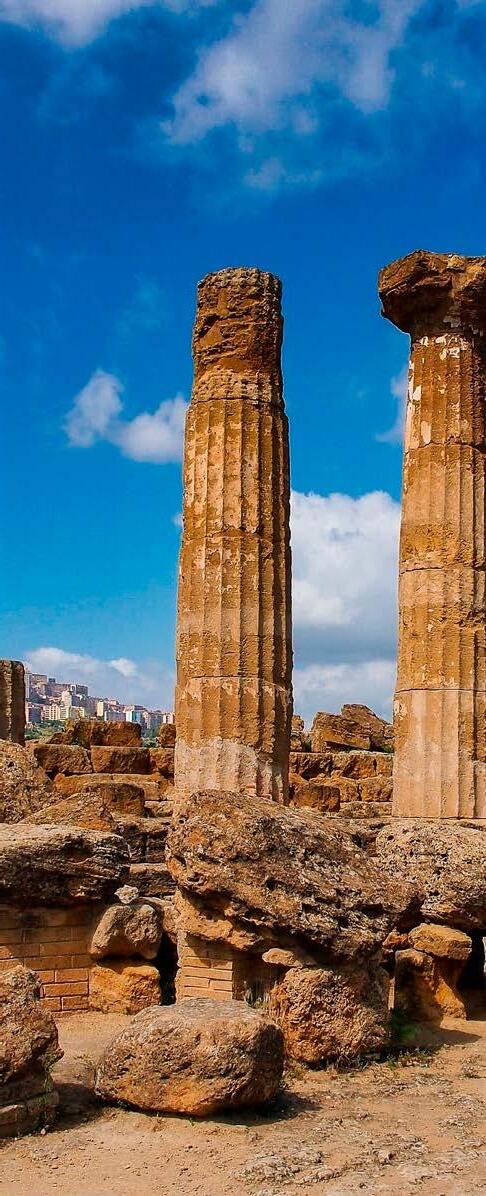
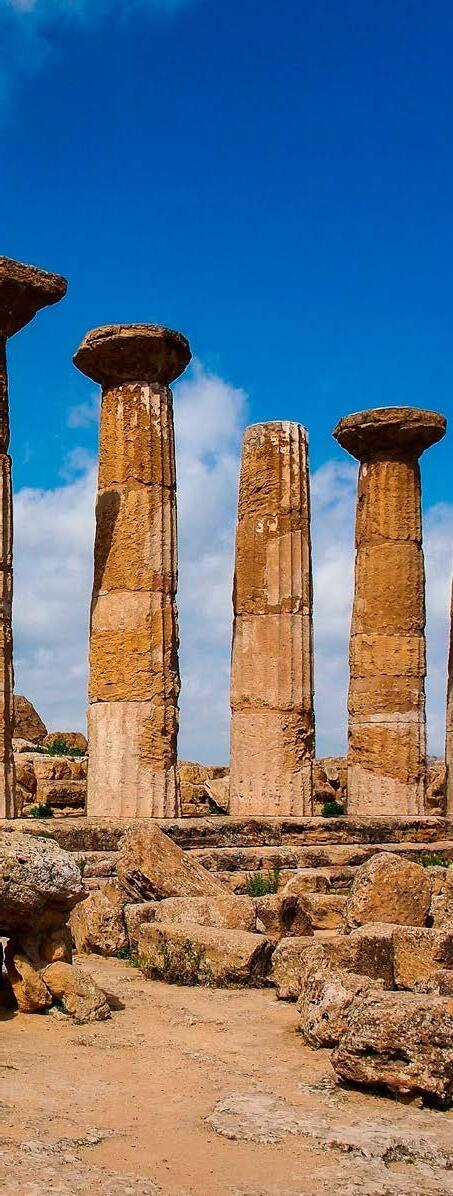
IN 2026
In this unit, you’ll explore the rise of early societies in Ancient Mesopotamia, often called the ‘cradle of civilisation’. You’ll investigate how city-states and empires formed, and why the invention of writing was such a major turning point in human history.
You’ll also learn how language, culture, and power shaped these early communities. Using primary sources like artefacts and ancient texts, you’ll develop a greater understanding of how ancient civilisations have laid the foundations for the world we live in today.
▪ Discovering civilization
▪ Ancient empires
In this unit, you’ll explore the rise of Ancient Egypt and how power was shown during the Old and Middle Kingdoms, as well as the Second Intermediate Period.
You’ll learn how the Nile River supported Egypt’s growth and helped it become one of the longest-lasting civilisations in history. Unlike Mesopotamia, Egypt was mostly protected from invasion, allowing it to flourish.
You’ll also use primary sources like artefacts and ancient texts to investigate how Egyptians lived, ruled, and built a civilisation that lasted over 3,000 years.
▪ Egypt: The double crown
▪ Middle Kingdom Egypt: Power and propaganda
ENTRY REQUIREMENTS
There are no prerequisites for entry to Units 1 & 2.
ASSESSMENT
Unit 1 & 2
▪ Teachers’ decision that students have demonstrated achievement of a set of VCAA specified outcomes. Unit 3 & 4
VCE Ancient History – Units 3 & 4 in 2027
Unit 1
You’ll explore how people, businesses, and governments make decisions to meet society’s needs and wants. You’ll learn key economic concepts, how markets work, and what motivates consumers and businesses. You’ll use demand and supply models to explain price changes and investigate how markets allocate resources. You’ll also explore behavioural economics and how governments and businesses use these insights.
Unit 2
The focus shifts to improving living standards where you will look at how economic growth helps raise living standards and the trade-offs involved. You’ll also explore how we measure wellbeing and whether those measures are enough. Finally, you’ll investigate two real-world economic issues using data and economic thinking to understand causes, impacts, and possible solutions.
▪ Thinking like an economist
▪ Decision-making in markets
▪ Behavioural economics
▪ Economic activity
▪ Applied economic analysis of local, national and international economic issues
Unit 3
You’ll explore how markets work in Australia and how the government steps in when markets don’t deliver fair outcomes. You’ll learn how prices are set, what affects supply and demand, and how markets can succeed or fail in improving living standards. You’ll also look at the bigger picture: how the whole economy works, what drives economic growth, and how Australia’s trade with other countries affects our economy.
Unit 4
Focusing on how the government and the Reserve Bank use policies to manage the economy, you’ll learn how the budget and interest rates are used to influence spending, inflation, and employment. You’ll also explore long-term strategies to boost productivity and competitiveness. Throughout both units, you’ll apply economic thinking to real-world issues and assess how well Australia is meeting its economic goals.
▪ An introduction to microeconomics: the market system, resource allocation and government intervention
▪ Domestic macroeconomic goals
▪ Australia and the international economy
▪ Aggregate demand policies and domestic economic stability
▪ Aggregate supply policies
There are no prerequisites for entry to Units 1 & 2.
Students must undertake Unit 3 & 4 as a sequence.
Unit 1 & 2
▪ Teachers’ decision that students have demonstrated achievement of a set of VCAA specified outcomes.
Unit 3 & 4
▪ School-assessed coursework: 50%
▪ Written examination: 50%
Unit 1
Learn how accounting helps track the success or failure of a business. You’ll explore how financial information is used by business owners and stakeholders to make decisions. You’ll record transactions and prepare reports for service businesses owned by sole traders. You’ll also analyse business performance using financial and non-financial data, and consider ethical, social, and environmental impacts when making decisions.
Unit 2
The focus shifts to trading businesses. You’ll build on your skills by learning how to manage inventory, accounts receivable and payable, and non-current assets. You’ll use both manual and digital tools (like spreadsheets) to prepare reports and budgets. You’ll evaluate business performance and suggest strategies for improvement. Throughout both units, you’ll apply the Conceptual Framework and financial indicators to real-world scenarios, while considering the ethical responsibilities of business owners.
Areas of Study
▪ The role of accounting
▪ Recording financial data and reporting accounting information for a service business
▪ Accounting for and managing inventory
▪ Accounting for and managing accounts receivable and accounts payable
▪ Accounting for and managing non-current assets
Unit 3
Examine financial accounting for a trading business owned by a sole trader. You’ll learn how to use the double-entry system to record transactions and prepare reports using the accrual method and the perpetual inventory system. You’ll explore how accounting helps business owners make informed decisions and how to analyse reports to suggest ways to improve performance. Ethical, social, and environmental factors are also considered when making business decisions.
You’ll build on this knowledge by learning more advanced accounting processes, including balance day adjustments and different depreciation methods. You’ll explore the importance of budgeting and how it helps businesses plan for the future. You’ll also analyse reports and graphs to evaluate business performance and recommend strategies for improvement. Throughout both units, you’ll apply the Conceptual Framework and financial indicators to real-world scenarios.
▪ Recording and analysing financial data
▪ Preparing and interpreting accounting reports
▪ Extension of recording and reporting
▪ Budgeting and decision-making
There are no prerequisites for entry to Units 1 & 2.
Students must undertake Unit 3 & 4 as a sequence.
Unit 1 & 2
▪ Teachers’ decision that students have demonstrated achievement of a set of VCAA specified outcomes.
Unit 3 & 4
▪ School-assessed coursework: 50%
▪ Written examination: 50%
Unit 1
Explore how sociologists study society by focusing on two key areas: youth and family. You’ll learn how the experience of being young can vary across cultures and time, and how stereotypes can affect young people. You’ll also look at different types of families in Australia and around the world, and how social, cultural, and economic factors shape family life. You’ll use sociological theories like functionalism and feminism to understand these topics.
The focus shifts to deviance and crime where you will explore what society considers “normal” behaviour, why people break rules, and how crime is linked to factors like age, gender, and social conditions. You’ll learn about theories of deviance, moral panic, and different types of punishment. You’ll also analyse real-world examples and use data to understand how crime and justice affect individuals and society.
▪ Category and experience of youth
▪ The family
▪ Deviance
▪ Crime
Unit 3
Exploring how culture and ethnicity are expressed in Australia, you will look at the history and current experiences of Australian Indigenous cultures, and how public awareness has changed over time. You’ll also study ethnicity, how people identify with cultural groups, and how these identities are shaped by social, political, and cultural influences. You’ll consider how stereotypes and outsider views can affect how groups are seen and treated.
You’ll explore how the idea of community has changed due to technology, politics, and social change. You’ll study different types of communities and how people experience them. You’ll also investigate social movements, groups working to create change, and learn how they form, grow, and influence society. Throughout both units, you’ll use sociological theories and real-world examples to understand how people connect, organise, and push for change.
▪ Australian Indigenous cultures
▪ Ethnicity
▪ Community
▪ Social movements and social change
There are no prerequisites for entry to Units 1 & 2.
Students must undertake Unit 3 & 4 as a sequence.
Unit 1 & 2
▪ Teachers’ decision that students have demonstrated achievement of a set of VCAA specified outcomes.
Unit 3 & 4
▪ School-assessed coursework: 50%
▪ Written examination: 50%

Year 7 Year 8 Year 9 Year 10 Year 11 Year 12
FOUNDATION MATHEMATICS
MATHEMATICS
MATHEMATICS
MATHEMATICS
MATHEMATICS
MATHEMATICS ENHANCEMENT
MATHEMATICS ENHANCEMENT
ADVANCED MATHEMATICS
ADVANCED MATHEMATICS
GENERAL MATHEMATICS
Units 1 & 2
MATHEMATICAL METHODS
Units 1 & 2
SPECIALIST MATHEMATICS
Units 1 & 2
GENERAL MATHEMATICS
Units 3 & 4
MATHEMATICAL METHODS
Units 3 & 4
SPECIALIST MATHEMATICS Units 3 & 4
YEAR 10
YEAR LONG SUBJECT
This subject helps you build essential mathematics skills for everyday life, work, and future study. You’ll explore topics like numeracy, measurement, finance, statistics, probability, and basic geometry using mental, written, and tech-based methods.
It’s designed for students who’ve found mathematics challenging in the past and are planning a Vocational Major or a VCE without mathematics. Foundation Mathematics focuses on practical understanding rather than advanced theory.
YEAR 10
YEAR LONG SUBJECT
This subject builds your skills in problemsolving, modelling, and using technology to explore real-world mathematics. You’ll study number, algebra, measurement, space, statistics, and probability. Key topics include solving equations, working with formulas, using Pythagoras and trigonometry, analysing data, and exploring networks.
You’ll also learn how to use digital tools to support your learning. This course prepares you for VCE General Mathematics and helps you apply mathematics confidently in everyday life and future study.
► Your pathway to VCE General Mathematics
YEAR 10
YEAR LONG SUBJECT
This course is for students who enjoy mathematics and are considering careers in science, engineering, commerce, or computing.
You’ll explore advanced algebra, graphing, and solve real-world problems using linear and exponential functions. You’ll also study trigonometry, including bearings and 3D applications, and dive into statistics and probability.
This course builds strong problemsolving skills and prepares you for VCE Mathematical Methods, Specialist Mathematics, or General Mathematics.
► Your pathway to VCE Mathematical Methods, Specialist Mathematics, or General Mathematics.
These units are perfect for students planning to study VCE General Mathematics in Units 3 and 4. You’ll explore key areas like data analysis, probability, statistics, algebra, functions, graphs, measurement, space, and discrete maths. You’ll learn how to solve problems using equations, graphs, networks, and financial maths, and apply these skills to real-world situations.
You’ll use both manual methods and digital tools (like spreadsheets and calculators) to work with numbers, create graphs, and analyse data. You’ll also explore how to estimate, calculate, and interpret results using different mathematical techniques.
Throughout the subject, you’ll build confidence in using maths to make decisions, solve problems, and understand the world around you. These units are designed to strengthen your skills and prepare you for further study or everyday applications of mathematics.
▪ Data analysis, probability and statistics
▪ Algebra, number and structure
▪ Functions, relations and graphs
▪ Discrete mathematics
▪ Space and measurement
These units focus on applying maths to real-world situations. In Unit 3, you’ll study Data Analysis and Recursion and Financial Modelling, learning how to interpret data, work with statistics, and model financial scenarios like loans and investments.
In Unit 4, you’ll explore Matrices and Networks and Decision Mathematics, using maths to solve problems involving connections, paths, and decision-making. You’ll build on skills from Units 1 & 2, using equations, graphs, algorithms, and technology to solve problems. You’ll also use tools like spreadsheets and calculators to support your learning and assessments.
These units are ideal if you’re interested in practical maths for everyday life, business, or further study. You’ll develop strong problem-solving skills and learn how to use maths to make informed decisions in real-life contexts.
▪ Data analysis, probability and statistics
▪ Discrete mathematics
▪ There are no prerequisites for entry to Units 1 & 2.
▪ Foundation Mathematics students will need to undertake supplementary study to meet the assumed knowledge requirements for General Mathematics Units 1 & 2.
▪ Students who have not completed General Mathematics Units 1 & 2 will need to undertake supplementary study to meet the assumed knowledge requirements for General Mathematics Units 3 & 4.
Students must undertake Unit 3 & 4 as a sequence.
Unit 1 & 2
▪ Teachers’ decision that students have demonstrated achievement of a set of VCAA specified outcomes.
Unit 3 & 4
▪ School-assessed coursework: 40%
▪ Written examination: 60%
Unit 1
You will explore the foundational concepts of algebraic functions through four key areas: Functions, Relations and Graphs; Algebra, Number and Structure; Calculus; and Data Analysis, Probability and Statistics. While all areas are introduced, the algebraic content continues into Unit 2, allowing for deeper engagement and continuity.
You are expected to develop and apply a range of mathematical techniques, including symbolic manipulation, graphical analysis, and algorithmic processes. These will be supported by both mental strategies and the appropriate use of technology.
Unit 2
Building on this foundation, introducing transcendental functions and extending your understanding of calculus, particularly in the context of modelling and problem-solving.
Across both units, you will be encouraged to make connections between topics, apply your knowledge to unfamiliar contexts, and use digital tools to enhance your mathematical reasoning and communication.
▪ Functions, relations and graphs
▪ Algebra, number and structure
▪ Calculus
▪ Data analysis, probability and statistics
These units extend your understanding of algebra, functions, calculus, and probability, with a strong focus on realworld and theoretical applications. In Unit 3, you’ll explore functions and graphs, algebra, and begin applying calculus to solve problems involving rates of change and optimisation. You’ll also study recursion and financial modelling.
In Unit 4, you’ll build on this by learning about integration, probability distributions, and statistical analysis. You’ll explore how to model and solve problems using continuous and discrete data and apply calculus to areas like probability and area under curves.
You’ll use both manual methods and technology (like graphing calculators and spreadsheets) to solve problems, sketch graphs, and analyse data. These units prepare you for further study in mathematics, science, engineering, and commerce, and help you develop strong analytical and problem-solving skills.
▪ Functions, relations and graphs
▪ Algebra, number and structure
▪ Calculus
▪ Data analysis, probability and statistics
▪ Students undertaking Mathematical Methods Units 1 and 2 are assumed to have a sound background in number, algebra, function, geometry, probability and statistics.
▪ Students who have not completed Mathematical Methods Units 1 & 2 will need to undertake supplementary study to meet the assumed knowledge requirements for Mathematical Methods Units 3 & 4.
Students must undertake Unit 3 & 4 as a sequence.
ASSESSMENT
Unit 1 & 2
▪ Teachers’ decision that students have demonstrated achievement of a set of VCAA specified outcomes.
Unit 3 & 4
▪ School-assessed coursework: 40%
▪ Written examination: 60%
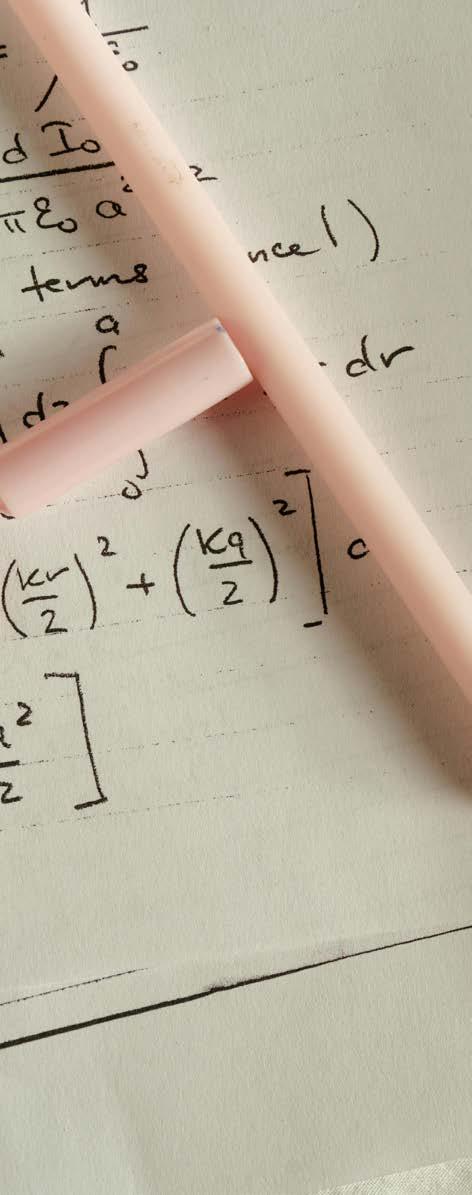
This subject is for students who enjoy a challenge and want to explore maths in depth. It’s ideal if you’re considering careers in engineering, physics, computer science, or advanced mathematics.
You’ll study topics like algebra, functions, graphs, discrete maths, probability, statistics, space, and measurement. You’ll also work with complex numbers, vectors, matrices, and logic.
You’ll learn how to solve problems, construct proofs, and use algorithms, both by hand and with technology. These units are designed to be taken alongside Mathematical Methods Units 1 & 2, as they build a strong foundation for Specialist Mathematics Units 3 & 4.
Throughout the course, you’ll use digital tools to support your learning and apply mathematical thinking to real-world and theoretical problems. This subject is perfect for students who are curious, analytical, and ready to take their maths skills to the next level.
▪ Algebra, number and structure
▪ Discrete mathematics
▪ Data analysis, probability and statistics
▪ Space and measurement
▪ Functions, relations and graphs
Designed for students who love maths and want to explore it at a deeper level. You’ll study advanced topics including algebra, calculus, functions, graphs, discrete maths, probability, statistics, space, and measurement. In Unit 3, you’ll focus on functions, algebra, space, and the beginnings of calculus and discrete maths. In Unit 4, you’ll build on this with integration, probability distributions, and more advanced applications of calculus and statistics.
You’ll learn how to solve complex problems, construct mathematical proofs, and use algorithms. You’ll also use technology like graphing tools and spreadsheets to support your learning and assessments.
These units require strong skills from Mathematical Methods and Specialist Maths Units 1 & 2, and are best taken alongside or after Mathematical Methods Units 3 & 4.
▪ Algebra, number and structure
▪ Discrete mathematics
▪ Data analysis, probability and statistics
▪ Calculus
▪ Space and measurement
▪ Functions, relations and graphs
▪ Students undertaking Specialist Mathematics Units 1 and 2 are assumed to have a sound background in number, algebra, function, geometry, probability and statistics.
▪ Enrolment in Specialist Mathematics Units 3 and 4 assumes a current enrolment in, or previous completion of, Mathematical Methods Units 3 and 4.
Students must undertake Unit 3 & 4 as a sequence.
Unit 1 & 2
▪ Teachers’ decision that students have demonstrated achievement of a set of VCAA specified outcomes. Unit 3 & 4
▪ School-assessed coursework: 40%
▪ Written examination: 60%

YEAR 10
SEMESTER BASED ELECTIVE
Build your own movement style by exploring dance from different cultures, times, and places. You’ll learn how to express ideas through your body using space, time, dynamics, and relationships.
You’ll improve your technique, performance skills, and awareness of safety in solo and group work.
You’ll also explore traditional and contemporary dance styles, reflect on choreographers’ unique approaches, and discover how dancers grow their practice and contribute to the art of dance.
► Your pathway to VET Dance
YEAR 10
SEMESTER BASED ELECTIVE
In this subject, you’ll create and perform original characters and stories using modern drama techniques.
You’ll explore different ideas and themes through creative play-making and respond to a variety of stimulus materials. You’ll study performance styles and conventions, including the work of Australian drama practitioners.
As you develop your expressive and performance skills, you’ll also learn how to use production elements safely and sustainably. This course helps you build confidence, creativity, and collaboration through performance.
► Your pathway to VCE Drama
YEAR 10
SEMESTER BASED ELECTIVE
Develop your performance skills using voice, instruments, and music technology.
You’ll explore different styles and genres, learn how music communicates ideas, and improve your understanding of musical elements like rhythm, pitch, and dynamics.
You’ll also create your own music and reflect on how musicians connect with audiences in solo and group settings.
If you’re interested in the music industry, there’s an option to explore real-world skills for future pathways in music.
► Your pathway to VCE Music Contemporary Performance
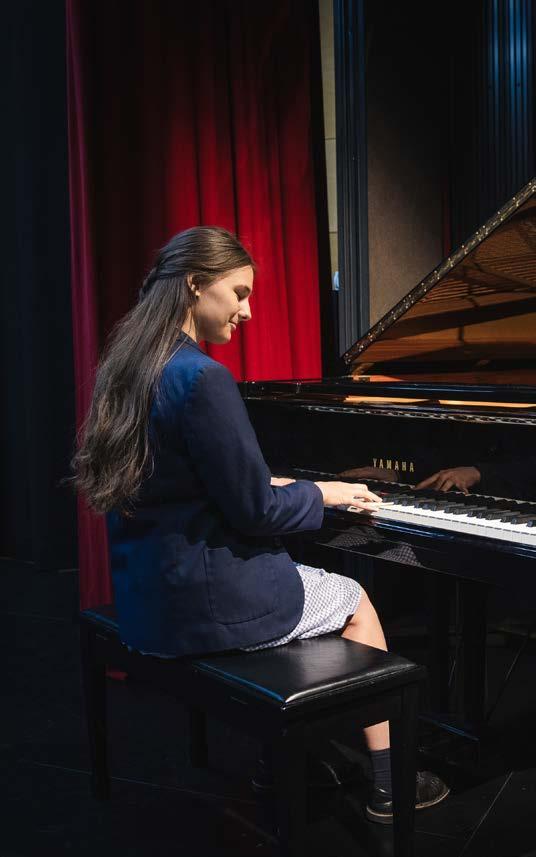
Explore how music is organised and how it can be used to create specific effects. You’ll perform solo and ensemble pieces to build your technical skills, expression, and understanding of different styles. At least two of your performances will connect directly to your study of how music is structured.
You’ll also create short musical exercises through composing, arranging, or improvising that reflect your understanding of musical organisation and creative processes. As you listen to and analyse a wide range of music, you’ll learn how composers use elements like pitch, rhythm, dynamics, and texture to communicate ideas.
You’ll explore how music from different cultures, styles, and time periods creates meaning and emotion, and you’ll apply this knowledge in your own work. Throughout the unit, you’ll continue developing your music literacy, including reading, writing, and notating music, while using technology and instruments to support your learning and creativity.
Areas of Study
▪ Performing
▪ Creating
▪ Analysing and responding
Perfect for students who enjoy performing, composing, and exploring music in creative ways. You’ll work both individually and in groups to create, arrange, and perform music that reflects your personal interests and influences. You’ll explore how music is organised and how it can be used to create specific effects or moods.
You’ll perform solo and ensemble pieces to develop your technical skills, expression, and understanding of different styles. You’ll also compose or arrange short pieces that show your understanding of musical elements like rhythm, pitch, dynamics, and structure.
As you listen to and analyse music from different times and cultures, you’ll learn how composers use musical elements and devices to communicate ideas. You’ll reflect on how these techniques influence your own music-making and develop your ability to talk and write about music using correct terminology.
▪ Music making
▪ Analysing for music making
▪ Responding
There are no prerequisites for entry to Units 1 & 2.
Students must undertake Unit 3 & 4 as a sequence.
Unit 1 & 2
▪ Teachers’ decision that students have demonstrated achievement of a set of VCAA specified outcomes.
Unit 3 & 4
▪ School-assessed coursework: 35%
▪ Written examination: 15%
▪ Externally assessed task: 50%
Explore and perform a range of drama styles from different cultures, time periods, and communities. You’ll learn how to tell powerful stories through performance, using techniques that go beyond everyday reality. You’ll create solo and group performances based on real or imagined characters, using stimulus materials like music, artworks, or stories including those from Aboriginal and Torres Strait Islander Peoples.
You’ll experiment with dramatic elements, conventions, and production areas to shape your work and communicate meaning. You’ll also study how professional drama practitioners create performances and reflect on your own creative process. Through play-making, you’ll develop expressive skills, build characters, and explore how drama can represent Australian identity and diverse perspectives.
You’ll document your creative choices and analyse both your own work and that of others, gaining a deeper understanding of how drama can inspire, challenge, and connect with audiences.
▪ Creating a devised performance
▪ Presenting a devised performance
▪ Analysing a devised performance
▪ Analysing and evaluating a professional drama performance
Work both in groups and individually to create original performances using a variety of drama styles and techniques. You’ll explore the work of different drama practitioners and learn how to use conventions like transformation of character, time and place, and symbolism to shape your performances. You’ll respond to stimulus materials such as stories, artworks, or music to develop meaningful solo and ensemble pieces that reflect personal, cultural, or community experiences.
You’ll also explore Australian identity through drama, including the perspectives of Aboriginal and Torres Strait Islander Peoples. As you create, you’ll experiment with dramatic elements, expressive skills, and production areas, while considering sustainability in your design choices. You’ll document your creative process and evaluate both your own work and professional performances. This unit helps you build confidence, creativity, and collaboration skills while deepening your understanding of contemporary drama practices.
▪ Devising and presenting ensemble performance
▪ Analysing and evaluating a devised performance
▪ Analysing and evaluating a professional drama performance
▪ Demonstrating techniques of solo performance-making
▪ Devising a solo performance
▪ Analysing and evaluating a devised solo performance
There are no prerequisites for entry to Units 1 & 2.
Students must undertake Unit 3 & 4 as a sequence.
Unit 1 & 2
▪ Teachers’ decision that students have demonstrated achievement of a set of VCAA specified outcomes.
Unit 3 & 4
▪ School-assessed coursework: 40%
▪ Written examination: 25%
▪ Performance Evaluation: 35%

50 John Paul College
Year 7 Year 8 Year 9 Year 10 Year 11 Year 12 RELIGIOUS EDUCATION RELIGIOUS EDUCATION
EDUCATION
RELIGION & SOCIETY Units 1 & 2
RELIGION & SOCIETY Units 3 & 4
TEXT AND TRADITIONS Units 1 & 2
TEXT AND TRADITIONS Units 3 & 4
* Students are required to select one Religious Education subject
If you choose not to study Units 3 and 4 Religion and Society or take part in the CSYMA program in Year 11, you’ll still engage in religious education through our school-based program, which runs across both Years 11 and 12.
This program offers a broad and engaging look at faith, values, and culture. You’ll begin with “Introduction to the Catholic Faith,” where you’ll explore Christianity’s roots in Judaism, key Catholic beliefs like the Nicene Creed, and the role of Sacraments and Precepts in daily life. In “Religion and Human Dignity,” you’ll reflect on the importance of treating every person with respect and fairness, using texts that highlight the value of each individual.
You’ll also explore how religion is expressed through the arts - sculpture, music, film and how different cultures use these forms to share their beliefs. A special focus will be placed on Indigenous Australian spirituality, where you’ll learn about ‘The Dreaming’ and the deep connection between land, identity, and sacred stories.
Finally, you’ll explore three core values of religious life: service, spirituality, and living a good life. These units combine theory with practical tasks to help you understand how these values are lived out in real-world contexts.
This program is designed to be meaningful, reflective, and relevant helping you grow in understanding and compassion, no matter your background.
There are no prerequisites for entry to Units 1 & 2.
The school based program is available to students who have chosen not to undertake a study of VCE Texts & Traditions, Religion & Society or CSYMA Youth Academy
There are no formal VCE tasks for these courses. Each course has classwork and an assessment component that students must complete.
You’ll explore the origins of religion and how it has shaped societies over time. You’ll learn how spiritualities, religious traditions, and denominations influence personal and group identity, and how new ideas and individuals continue to shape these beliefs. You’ll also examine the complex relationships between religion, culture, and society especially in Australia.
The unit also focuses on ethics, how we decide what’s right or wrong. You’ll explore questions like: What makes something good? Should we follow our feelings, society’s rules, or religious teachings? You’ll study different ethical theories and decision-making methods, and how they influence personal and community choices.
You’ll also look at how ethics is shaped by family, culture, religion, and media, and how these values impact laws, social systems, and everyday behaviour. This unit helps you think critically about moral issues in a world where many different beliefs and worldviews exist.
▪ The nature and purpose of religion
▪ Religion through the ages
▪ Religion in Australia
▪ Ethical decision-making and moral judgment
▪ Religion and ethics
▪ Ethical issues in society
Throughout history and across cultures, people have asked big questions about life: Where do we come from? Is there something greater than us? What is our purpose? What happens after death? In response, different worldviews - religious, spiritual, philosophical, scientific, have developed to help explain life’s meaning. Religion, in particular, offers answers through beliefs and practices that help people understand their place in the world and their relationship with others, nature, and a higher power.
In this unit, students explore the purpose of religion and how religious beliefs respond to life’s big questions. They examine how beliefs are expressed through symbols, rituals, and stories, and how these help followers find meaning. Students also look at how religion interacts with society, including how it responds to challenges and change. The focus is on major world religions such as Buddhism, Christianity, Hinduism, Islam, Judaism, and Sikhism, and how they continue to evolve over time.
▪ Responding to the search for meaning
▪ Expressing meaning
▪ Significant life experiences, religious beliefs and faith
▪ Challenge and response
▪ Interaction of religion and society
There are no prerequisites for entry to Units 1 & 2.
Students must undertake Unit 3 & 4 as a sequence.
Students seeking to undertake Unit 3 & 4 are required to have achieved an overall result of at least 75% in Units 1 and 2.
▪ Teachers’ decision that students have demonstrated achievement of a set of VCAA specified outcomes. Unit 3 & 4
▪ School-assessed coursework: 50%
▪ Written examination: 50%
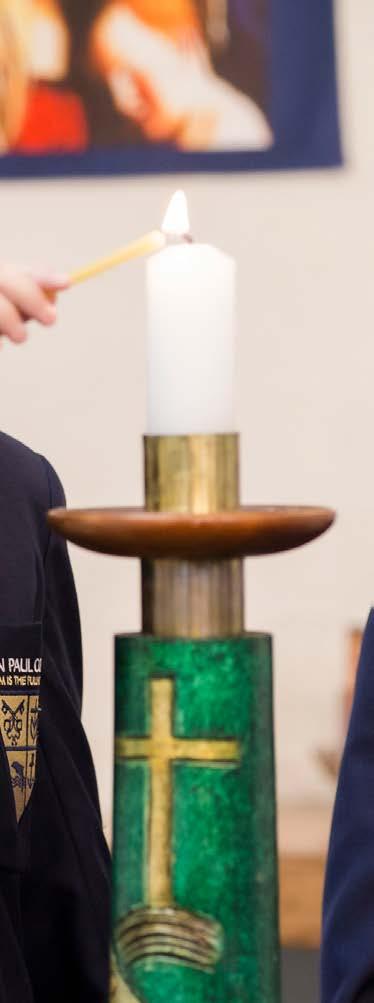
Explore the role of sacred texts in religion - what they are, why they matter, and how they’ve shaped beliefs and actions over time. You’ll learn how to read and interpret these texts using a method called exegesis, which helps uncover deeper meanings and understand how these texts were written and used in their original context.
We’ll also look at how sacred texts are used today to respond to big issues like justice, gender, racism, and the environment. You’ll see how these texts can challenge or support social values and institutions, and how they continue to influence people both inside and outside religious communities.
You’ll study texts from one or more religious traditions and compare how they address similar social issues. By the end of the unit, you’ll have a better understanding of how sacred texts shape beliefs, and how they’re shaped by the world around them.
Areas of Study
▪ The importance of sacred texts to the tradition
▪ The exegesis of texts
▪ Sacred texts and later traditions
▪ Sacred texts in the past
▪ Sacred texts today
▪ Comparing religious traditions
In this unit, we’ll explore how sacred texts help shape a religious tradition. These texts often tell stories, laws, teachings, and events that explain how a religion began and developed. You’ll learn about the society and culture where the texts were written, and how that context influenced what was written and why.
We’ll focus on a method called exegesis - a way of closely reading and interpreting texts. You’ll learn two key approaches: sociocultural criticism, which looks at the historical and cultural background of the text, and literary criticism, which focuses on the structure, style, and themes.
You’ll also explore how sacred texts respond to big issues like justice, gender, and authority, and how their messages have been reinterpreted over time. By the end of the unit, you’ll be able to explain how these texts continue to shape beliefs and values in both religious communities and society today.
▪ The background of the tradition
▪ Audience, purposes and literary aspects of the set texts
▪ Interpreting texts
▪ Religious themes and their teaching purpose
▪ Themes in the later tradition and the later use of scripture
There are no prerequisites for entry to Units 1 & 2.
Students must undertake Unit 3 & 4 as a sequence.
Students seeking to undertake Unit 3 & 4 are required to have achieved an overall result of at least 75% in Units 1 and 2.
Unit 1 & 2
▪ Teachers’ decision that students have demonstrated achievement of a set of VCAA specified outcomes.
Unit 3 & 4
▪ School-assessed coursework: 50%
▪ Written examination: 50%
THE ACU AND CSYMA YOUTH ACADEMY PROGRAM IS A FORMATION INITIATIVE FOR SENIOR SCHOOL YOUTH MINISTRY TEAMS (YEARS 11 AND 12), AND IS RUN IN PARTNERSHIP WITH THE AUSTRALIAN CATHOLIC UNIVERSITY (ACU) LA SALLE ACADEMY.
The Youth Academy aims to strengthen youth ministry and deepen young people’s faith by involving them in the Catholic Church’s life and mission. It provides skills for ministry while supporting their faith journey. The Academy consists of two parts: the Formation Program and the Faith and Outreach Program, totalling five modules. Completing all modules earns an award. The first four modules are part of the Formation Program. Upon completion, participants may be invited to join the Faith and Outreach Program, finishing with Module Five. The goal is to help you grow in faith, develop ministry skills, and become more active in the Church’s mission, offering a chance to learn, grow, and be recognised.
In this first module, you’ll learn how to share your faith in a way that feels real and relevant today. We’ll explore what it means to be a follower of Jesus and how to talk about your beliefs with confidence. You’ll get to practice telling your own faith story, learn how to start a Youth Ministry Team at your school, and even act out scenes to help bring your message to life. This module is all about learning, reflecting, and stepping into leadership as someone who can inspire others through faith.
Now it’s time to put your faith into action! After completing iWitness, you’ll be encouraged to lead faith-based activities for other students in your school or parish. You’ll work as part of a Youth Ministry Team, meeting regularly to plan and lead events like retreats, prayer services, and service projects. You’ll also connect with other schools, take part in training, and explore ways to serve across cultures. This module is about teamwork, leadership, and making a real impact in your community.
In this module, you’ll dive deeper into the heart of the Catholic faith. Through a six-session series called CHURCH, you’ll explore key beliefs, reflect on your own faith, and grow closer to God through prayer, worship, and the Eucharist. You’ll join or start a youth group, attend a special Youth Mass, and write a short reflection on your experience. This is your chance to connect more deeply with your Church community and strengthen your spiritual foundation.
In this module, you’ll attend the Youth in the Spirit Retreat—a time to step away from the everyday and focus on your relationship with God. You’ll explore how the Holy Spirit works in your life, discover new ways to grow in faith, and connect with others on the same journey. It’s a time for renewal, inspiration, and deepening your spiritual life.
If you complete the first four modules, you might be invited to join this final stage. Here, you’ll take everything you’ve learned and apply it through real outreach projects—like leading a retreat, joining a mission, or running a faith initiative at school. You’ll plan your project, carry it out, and reflect on what you’ve learned. This is where faith meets action, and you’ll see how your efforts can make a difference in the world.
Completing all the modules earns students the ACU and CSYMA Faith and Ministry Award. Excitingly, finishing the program can also get students 5 bonus ATAR points for a degree at the Australian Catholic University*. It’s a way to acknowledge each student’s skills and dedication, opening further study opportunities.
*Award of 5 bonus ATAR points on receipt of the ACU and CSYMA Faith and Ministry Award is subject to final approval by the Australian Catholic University.

Year 7 Year 8 Year 9 Year 10 Year 11 Year 12
PSYCHOLOGY
PSYCHOLOGY
ENVIRONMENTAL
CHEMISTRY*
YEAR 10
SEMESTER BASED ELECTIVE
In this elective, you’ll explore how Earth’s natural cycles interact and how natural disasters affect them. You’ll study different ecosystems, focusing on our local coastal marine environment. Through classroom, lab, and fieldwork activities, you’ll learn how to monitor physical, chemical, and biological processes.
You’ll also investigate how human actions impact the environment by examining current local and global issues. A key part of the course includes researching and presenting a specific environmental problem in depth.
► Your pathway to VCE Biology or Environmental Science
YEAR 10
SEMESTER BASED ELECTIVE
From the explosive beginnings of the Big Bang to the formation of stars, galaxies, and planetary systems, this elective explores how the universe began and evolved. You’ll examine key scientific evidence supporting this understanding, including red and blue shifts, cosmic microwave background radiation, and Hubble’s observations.
You’ll also learn how astronomers use light spectra and brightness to determine the composition, distance, and movement of stars. In addition, you’ll investigate the tools and technologies used to collect astronomical data and explore recent discoveries such as gravitational waves, dark matter, and dark energy.
► Your pathway to VCE Physics
YEAR 10
SEMESTER BASED ELECTIVE
In Biology, you’ll dive into the microscopic world of cell biology, exploring the types of cells that make up all living organisms, the ultrastructure of the cell and the biological mechanisms underpinning complex cellular processes. You’ll study key biomolecules and uncover how DNA works, including how it determines traits and passes them on, and explore how proteins are made and how genes are regulated. You’ll also be introduced to the fundamental biological concepts surrounding Population Genetics & Evolution.
► Your pathway to VCE Biology or Psychology
YEAR 10
SEMESTER BASED ELECTIVE
In this elective, you’ll explore key areas of Psychology, including the structure and function of the brain, how the nervous system functions and responds to external changes, how we define and measure intelligence and personality. You’ll learn about the history of intelligence testing and discover different theories of personality used by psychologists. The elective introduces you to atypical behaviour and the field of forensic psychology, where you’ll investigate how psychological principles are used to understand criminal behaviour.
Through engaging activities and discussions, you’ll build skills in critical thinking and scientific literacy. This subject is perfect if you’re curious about human behaviour and want to understand how psychological knowledge can be used to support individual and community well-being.
► Your pathway to VCE Psychology
YEAR 10
SEMESTER BASED ELECTIVE
In this Chemistry elective, you’ll revisit the structure of the atom and learn about the periodic table. You’ll explore how atoms bond, whether it’s ionic, covalent, or metallic, and learn to write balanced chemical formulas. You’ll investigate a range of chemical reactions, including precipitation reactions, neutralization reactions and reactions of organic compounds, and gain practice balancing chemical equations.
The course dives into what affects reaction rates and introduces biological catalysts like enzymes. It’s a handson, practical subject that builds your understanding of how chemistry works in the real world.
► Your pathway to VCE Chemistry or Physics
YEAR 10
SEMESTER BASED ELECTIVE
In this elective, you’ll explore the big ideas in science - matter, energy, time, and space, and how they apply to systems ranging in scale from atoms to the universe.
You’ll investigate how an object’s motion is influenced by a range of contact and non-contact forces such as friction, magnetism, gravity and electrostatic forces using Newton’s laws. And you will develop an understanding of the concept of energy and how energy transfer is associated with phenomena involving motion, heat, sound, light and electricity.
This subject will help you build a strong foundation in scientific thinking and prepare you for further studies in VCE Physics.
► Your pathway to VCE Chemistry or Physics
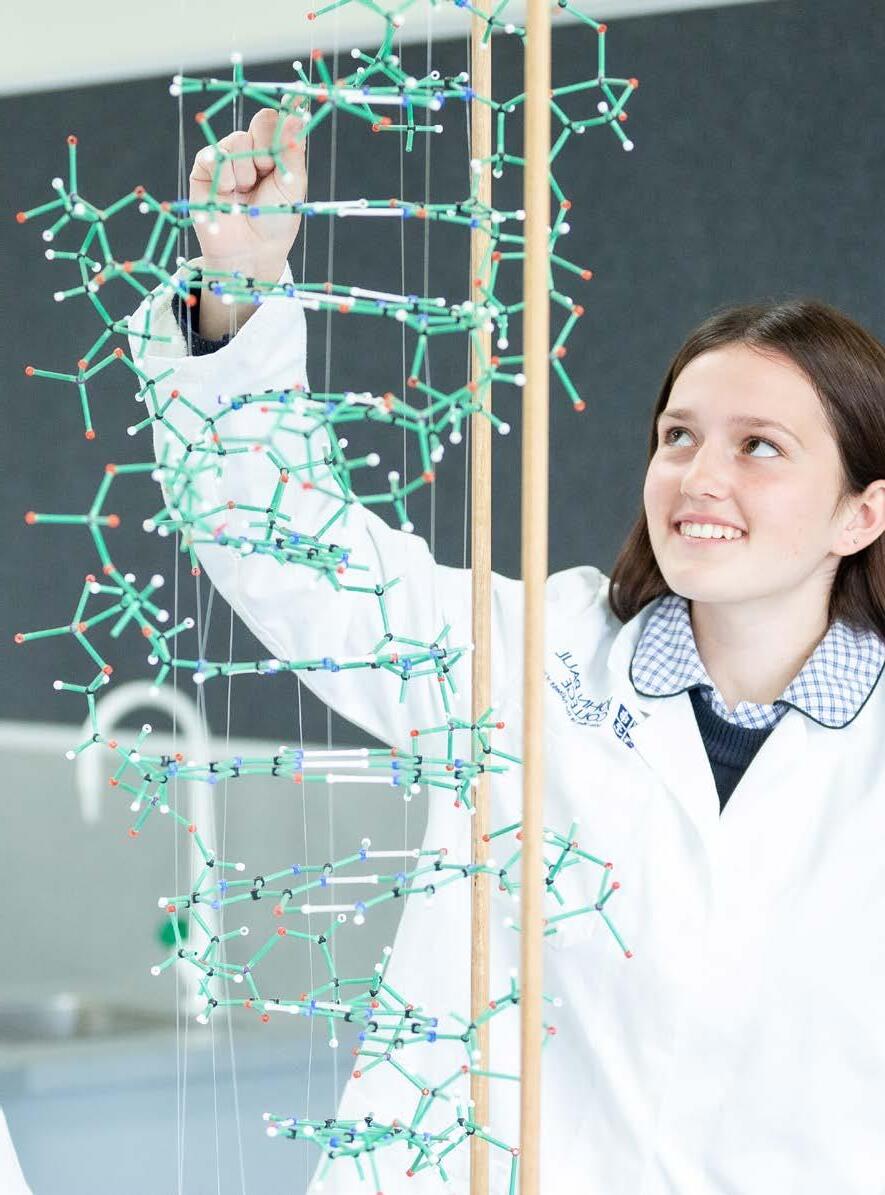
Unit 1
Exploring cells, the building blocks of life, you will learn how cells grow, divide, and die, and how stem cells help with repair and specialisation. You’ll investigate how systems work in plants and animals, and how homeostasis keeps internal conditions stable. You’ll also complete a practical investigation related to cells or body systems.
Unit 2
Study how traits are passed from one generation to the next. You’ll explore DNA, meiosis, and how genes and the environment influence what we see. You’ll learn to interpret inheritance patterns and predict genetic outcomes. You’ll compare asexual and sexual reproduction, including cloning, and study how organisms adapt to survive. You’ll also explore how species interact in ecosystems and the role of keystone species. Aboriginal and Torres Strait Islander knowledge will deepen your understanding of survival in Australian environments. You’ll complete a research project on a current ethical issue in biology.
Areas of Study
▪ How do cells function?
▪ How do plant and animal systems function?
▪ How do scientific investigations develop understanding of how organisms regulate their functions?
▪ How is inheritance explained?
▪ How do inherited adaptations impact on diversity?
▪ How do humans use science to explore and communicate contemporary bioethical issues?
Unit 3
You’ll explore how cells work by looking at DNA, proteins, and how genes are expressed in different organisms. You’ll learn how biotechnologies like CRISPR can be used to manipulate DNA and improve things like farming. You’ll also study how cells get energy through photosynthesis and respiration, and how these processes can be enhanced. You’ll apply your knowledge through a case study or investigation into a real-world issue.
Unit 4
Study the immune system and how it protects us from disease and explore how evolution is supported by evidence from fossils, DNA, and anatomy. You’ll look at how species change over time and how new technologies help us understand evolution. You’ll also complete a research project on a current ethical issue, such as gene editing, disease prevention, or conservation.
▪ What is the role of nucleic acids and proteins in maintaining life?
▪ How are biochemical pathways regulated?
▪ How do organisms respond to pathogens?
▪ How are species related over time?
▪ How is scientific inquiry used to investigate cellular processes and/or biological change?
There are no prerequisites for entry to Units 1 & 2. Students must undertake Unit 3 & 4 as a sequence.
ASSESSMENT
Unit 1 & 2
▪ Teachers’ decision that students have demonstrated achievement of a set of VCAA specified outcomes.
Unit 3 & 4
▪ School-assessed coursework: 50%
▪ Written examination: 50%
Unit 1
Explore how different materials like metals, polymers, and ionic compounds are structured and why they behave the way they do. You’ll learn how to measure chemical quantities and investigate how chemistry can help create more sustainable products. Through hands-on experiments, you’ll explore metal reactivity, chromatography, polymer synthesis, and more. You’ll also complete a research project on how materials can be produced sustainably using green chemistry and circular economy principles.
Focus on the chemistry behind everyday substances. You’ll investigate how acids, bases, and redox reactions work, and how gases are produced and measured. You’ll carry out practical experiments like volumetric analysis and using calibration curves. You’ll also complete a student-designed investigation related to water analysis, gas production, or chemical reactions. Throughout both units, you’ll use chemical language and formulas to explain your findings and evaluate scientific claims.
▪ How do the chemical structures of materials explain their properties and reactions?
▪ How are materials quantified and classified?
▪ How can chemical principles be applied to create a more sustainable future?
▪ How do chemicals interact with water?
▪ How are chemicals measured and analysed?
▪ How do quantitative scientific investigations develop our understanding of chemical reactions?
Unit 3
Explore how chemistry helps meet the world’s growing demand for energy and materials. You’ll compare different fuels, study how energy is produced in cells and batteries, and investigate how chemical reactions can be made more efficient and sustainable. You’ll also complete experiments on thermochemistry, redox reactions, and reaction rates, and carry out a research project on sustainable production using green chemistry and circular economy principles.
You’ll focus on carbon-based compounds found in fuels, food, medicines, and more. You’ll learn how these compounds are structured, how they react, and how they’re analysed in the lab. You’ll study food metabolism, how medicines work, and how organic compounds are identified using techniques like titration and distillation. You’ll also complete practical investigations and use chemical language to explain your findings and evaluate scientific claims.
▪ What are the current and future options for supplying energy?
▪ How can the rate and yield of chemical reactions be optimised?
▪ How are organic compounds categorised and synthesised?
▪ How are organic compounds analysed and used?
▪ How is scientific inquiry used to investigate the sustainable production of energy and/or materials?
There are no prerequisites for entry to Units 1 & 2. Students must undertake Unit 3 & 4 as a sequence. ASSESSMENT
Unit 1 & 2
▪ Teachers’ decision that students have demonstrated achievement of a set of VCAA specified outcomes.
Unit 3 & 4
▪ School-assessed coursework: 50%
▪ Written examination: 50%
Unit 1
You’ll explore how physicists use models to explain energy in the world around us. You’ll investigate light, heat, radioactivity, nuclear processes, and electricity, and apply your knowledge to real-world issues like climate change, communication, medical technology, and energy use in Australia. You’ll also learn how to represent and explain your findings using scientific language and equations.
Unit 2
You’ll discover how experiments help build scientific understanding. You’ll explore how forces move or hold objects in place and apply this to a motion-based case study. Then, you’ll choose from a wide range of topics like sports science, astrophysics, music, medical physics, or climate science and complete an investigation based on your interests. You’ll use physics to explain your findings and propose solutions to real-world problems. This unit is hands-on, creative, and a great way to see how physics connects to everyday life.
▪ How are light and heat explained?
▪ How is energy from the nucleus utilised?
▪ How can electricity be used to transfer energy?
▪ How is motion understood?
▪ How does physics inform contemporary issues and applications in society?
▪ How do physicists investigate questions?
Unit 3
You’ll explore how things move using Newton’s laws in one and two dimensions. You’ll learn about fields, gravitational, magnetic, and electric, and how they affect objects without touching them. You’ll also investigate how electricity is generated and delivered to homes, and how fields are used in technologies like particle accelerators.
Unit 4
Explore how light behaves as both a wave and a particle, and how matter can do the same. You’ll learn about Einstein’s theories, including time dilation and length contraction, and how they apply to real-world tech like GPS. You’ll be challenged to think beyond everyday experiences and explore how physics explains the universe at both the tiniest and fastest scales.
▪ How do physicists explain motion in two dimensions?
▪ How do things move without contact?
▪ How are fields used in electricity generation?
▪ How has understanding about the physical world changed?
▪ How is scientific inquiry used to investigate fields, motion or light?
There are no prerequisites for entry to Units 1 & 2
Students must undertake Unit 3 & 4 as a sequence.
Students entering Unit 3 without Units 1 and/or 2 may be required to undertake additional preparation.
Unit 1 & 2
▪ Teachers’ decision that students have demonstrated achievement of a set of VCAA specified outcomes.
Unit 3 & 4
▪ School-assessed coursework: 50%
▪ Written examination: 50%
Unit 1
You’ll explore how people develop psychologically and what happens when development doesn’t follow the expected path. You’ll learn how different cultures, including Aboriginal and Torres Strait Islander perspectives, have shaped our understanding of human thoughts, emotions, and behaviours. You’ll also study how the brain works, how it can change over time (brain plasticity), and how brain damage can affect behaviour.
Unit 2
You’ll focus on how we think about ourselves and others. You’ll explore how attitudes are formed, how we perceive people, and how culture influences behaviour. You’ll also learn about human perception, how we make sense of the world through our senses and what happens when that perception is distorted. You’ll investigate real-world examples and research that explain why people behave the way they do, and you’ll be encouraged to think critically about social issues and psychological research.
▪ What influences psychological development?
▪ How are mental processes and behaviour influenced by the brain?
▪ How does contemporary psychology conduct and validate psychological research?
▪ How are people influenced to behave in particular ways?
▪ What influences a person’s perception of the world?
▪ How do scientific investigations develop understanding of influences on perception and behaviour?
Unit 3
Explore how the nervous system works and how it helps us learn and remember. You’ll look at how stress affects the brain and body, including new research on the gut-brain connection. You’ll investigate how we learn, how memory works, and how different brain regions are involved. You’ll also explore memory techniques, including how Aboriginal and Torres Strait Islander peoples use place to store and recall knowledge.
Focus on sleep and mental wellbeing. You’ll learn how sleep works, why it’s important, and what happens when sleep patterns are disrupted. You’ll explore mental health as a continuum and use the biopsychosocial model to understand conditions like phobias. You’ll also look at how culture, including Aboriginal and Torres Strait Islander perspectives, influences wellbeing. Throughout both units, you’ll apply your knowledge through investigations, case studies, and real-world examples.
▪ How does the nervous system enable psychological functioning?
▪ How do people learn and remember?
▪ How does sleep affect mental processes and behaviour?
▪ What influences mental wellbeing?
▪ How is scientific inquiry used to investigate mental processes and psychological functioning?
There are no prerequisites for entry to Units 1 & 2. Students must undertake Unit 3 & 4 as a sequence.
ASSESSMENT
Unit 1 & 2
▪ Teachers’ decision that students have demonstrated achievement of a set of VCAA specified outcomes.
Unit 3 & 4
▪ School-assessed coursework: 50%
▪ Written examination: 50%
Unit 1
Explore how Earth’s four systems - the atmosphere, biosphere, hydrosphere, and lithosphere, interact and shape our planet. You’ll learn how natural events like volcanic eruptions and climate shifts, as well as human activities, impact ecosystems, air and water quality, and soil health. You’ll also look at how understanding past changes helps us predict and manage future environmental challenges.
Investigate how pollution affects Earth’s systems and threatens the availability of clean water and sustainable food. You’ll explore how pollutants impact plants, animals, and ecosystems, and how we can assess and manage these risks. You’ll also consider how to create sustainable systems that meet the needs of current and future generations.
▪ How are Earth’s systems organised and connected?
▪ How do Earth’s systems change over time?
▪ How do scientific investigations develop understanding of how Earth’s systems support life?
▪ How can we manage pollution to sustain Earth’s systems?
▪ How can we manage food and water security to sustain Earth’s systems?
▪ How do scientific endeavours contribute to minimising human impacts on Earth’s systems?
Unit 3
Explore how we manage the environment using sustainability principles. You’ll learn about biodiversity, why it matters, and how it supports human wellbeing. You’ll investigate threats to biodiversity and evaluate strategies to protect endangered species. Using a realworld case study, you’ll examine how environmental management affects Earth’s systems - atmosphere, biosphere, hydrosphere, and lithosphere.
You’ll explore what causes climate variability and how it affects people and ecosystems. You’ll compare renewable and non-renewable energy sources and evaluate their sustainability. You’ll also learn how science helps guide environmental decisions. Through data analysis, you’ll explore how to interpret environmental indicators, understand uncertainty, and assess the reliability of evidence. You’ll develop skills in making predictions, identifying patterns, and evaluating scientific claims - essential tools for tackling real-world environmental challenges.
▪ Why is maintaining biodiversity worth a sustained effort?
▪ When is development sustainable?
▪ How can we respond to climate change?
▪ What might be a more sustainable mix of energy sources?
▪ How is scientific inquiry used to investigate contemporary environmental challenges?
There are no prerequisites for entry to Units 1 & 2. Students must undertake Unit 3 & 4 as a sequence.
ASSESSMENT
Unit 1 & 2
▪ Teachers’ decision that students have demonstrated achievement of a set of VCAA specified outcomes.
Unit 3 & 4
▪ School-assessed coursework: 50%
▪ Written examination: 50%

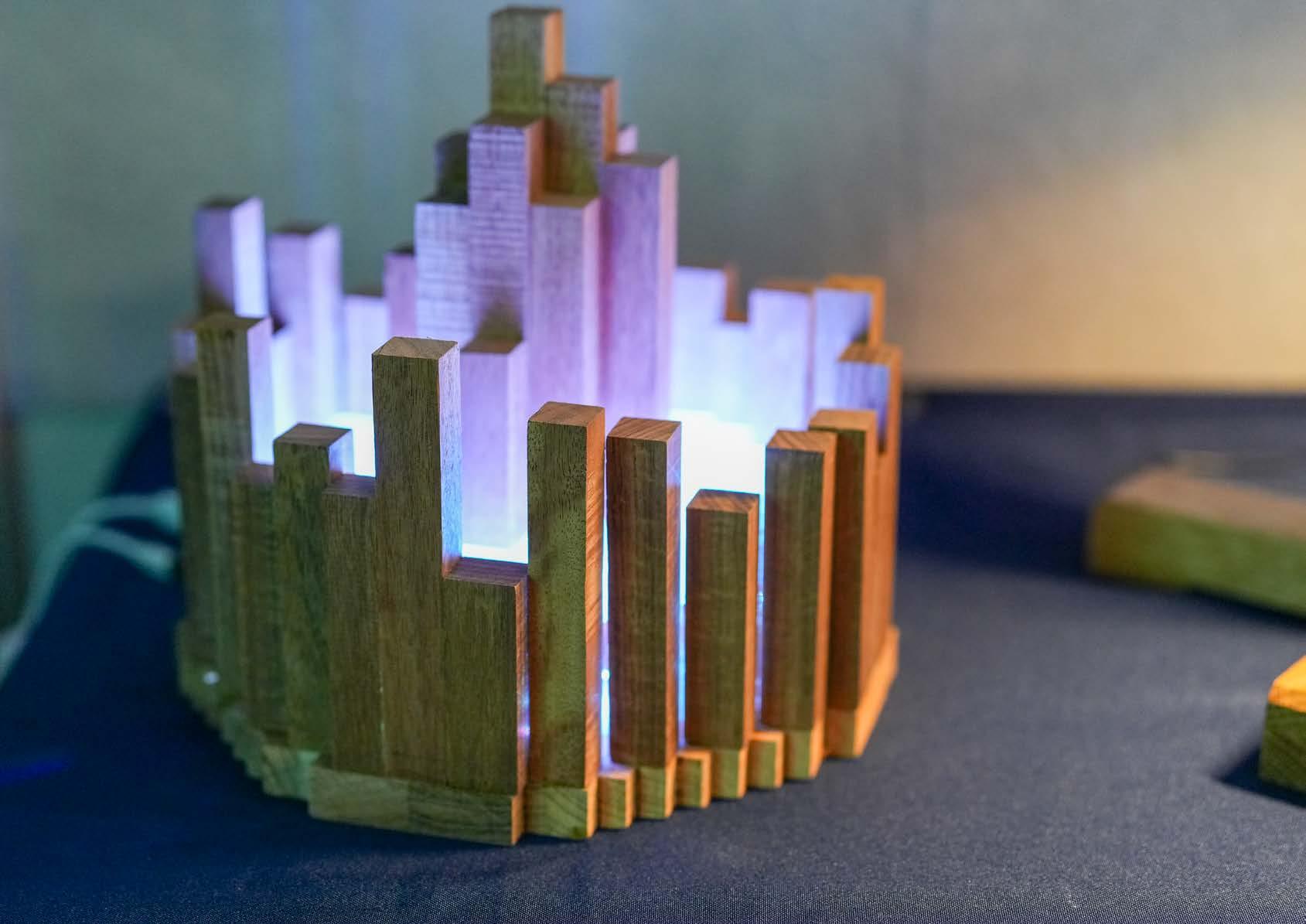
YEAR 10
SEMESTER BASED ELECTIVE
In this subject, you’ll explore how digital systems work and use tools like Python, Adobe, and Microsoft to design smart solutions, like wearable tech or apps, for real-world problems.
You’ll plan, code, and manage your own projects, considering user needs, accessibility, and design constraints. You’ll also learn about data compression, visualisation, and how to build modular programs using algorithms and objectoriented programming.
Along the way, you’ll work independently and in teams to create innovative digital products that make a difference.
► Your pathway to VCE Applied Computing
YEAR 10
SEMESTER BASED ELECTIVE
In Advanced Food Studies, you’ll explore where our food comes from and the science behind how it’s prepared. You’ll develop skills in recipe creation, sensory analysis, and comparing food products.
Through hands-on cooking sessions, you’ll learn how Australia’s food system works and how to design and evaluate your own food ideas.
This course sets you up for VCE Food Studies by building your knowledge of food production, nutrition, and sustainability in a fun, practical way.
► Your pathway to VCE Food Studies
YEAR 10
SEMESTER BASED ELECTIVE
In this subject, you’ll explore global cuisines and food cultures, including the food traditions of Victoria’s First Peoples and the impact of migration.
Through hands-on cooking, you’ll experience flavours from around the world. You’ll also investigate how food choices affect the environment and analyse the sustainability of food systems.
By considering social, ethical, and environmental factors, you’ll learn how to design food solutions for a better future.

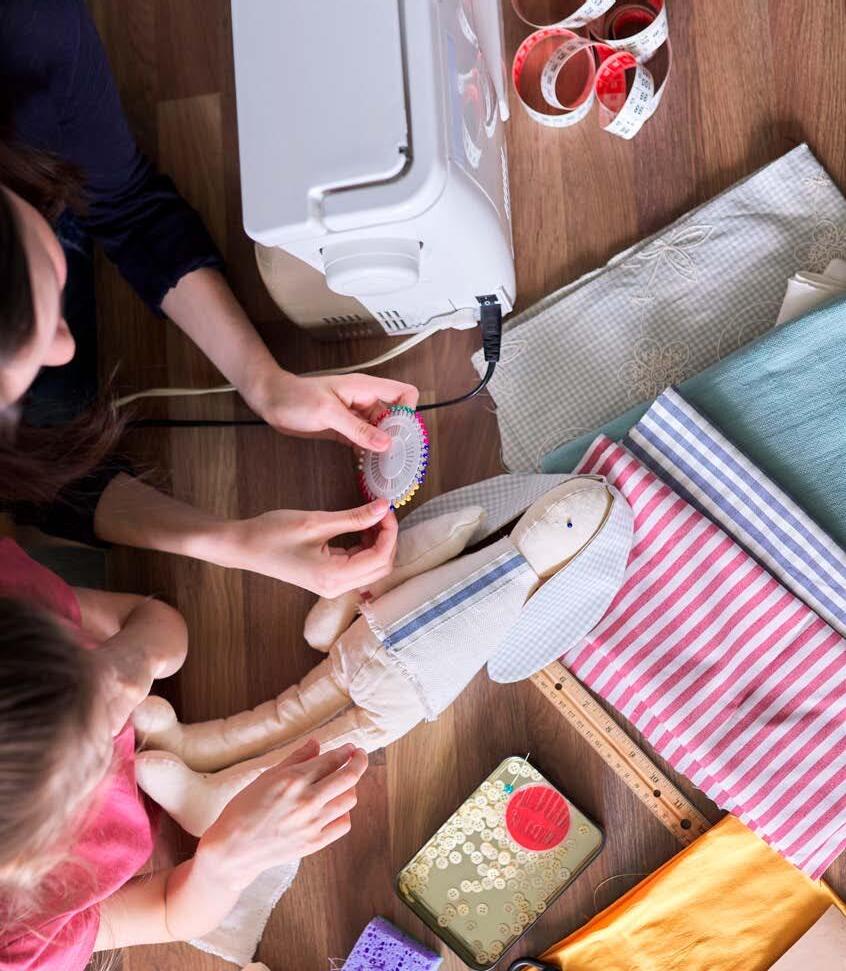
NEW IN 2026
YEAR 10
SEMESTER BASED ELECTIVE
In this subject, you’ll explore how motion, force, and energy are used to control electromechanical systems and create simple engineering solutions. You’ll also learn how to choose and combine materials, components, tools, and equipment to design and build effective solutions.
Assessment will include understanding electrical components, manufacturing and assembling a line-tracking mouse, programming using the Picaxe system, and using 3D printing to create a chassis.
This subject is all about starting to think like an engineer - solving problems, building smart systems, and bringing your ideas to life.
► Your pathway to VCE Systems Engineering
YEAR 10
SEMESTER BASED ELECTIVE
In Product Design Technologies, you will identify existing problems and work with clients by following the design process through designing & creating innovative solutions. You will investigate, research, develop ideas, create preferred option solutions and use processes involving CAD to bring ideas to life.
You will learn to evaluate outcomes based on design factors such as functionality, aesthetics & sustainability. Using a range of tools, processes and materials, you will manufacture products and reflect on how to improve and seek end-user feedback.
This course builds on creativity, problemsolving, and collaboration skills - just like in real industry design projects.
► Your pathway to VCE Product Design & Technology
10
SEMESTER BASED ELECTIVE
In this subject, you’ll explore sustainability in the textiles industry - from how cotton is grown to how garments are made and reused. You’ll learn about Fair Trade, Indigenous weaving, and the rise of Indigenous fashion.
Through hands-on projects, you’ll restyle and repurpose textiles, using a range of tools and techniques. You’ll work safely and ethically while making design decisions based on materials and purpose.
You’ll also evaluate your finished products and suggest ways to improve them.
► Your pathway to VCE Product Design & Technology and VET Fashion
Unit 1
Unit 1 introduces the stages of the problem-solving methodology. You’ll explore how data is used in tools like databases and spreadsheets to create visualisations, and how to build a working software solution using an object-oriented programming (OOP) language. You’ll use teacher-provided designs and data to create a solution that includes a database, spreadsheets, and visualisations. You’ll go on to design and develop a software solution using OOP, learning how to test and debug your code.
Unit 2
Explore innovation and cyber security, working in teams to identify a problem or opportunity and develop a creative solution using the problem-solving methodology. You’ll then explore network environments and investigate cyber security threats, proposing strategies to protect data and information.
Areas of Study
▪ Data analysis
▪ Programming
▪ Innovative solutions
▪ Cyber security
UNIT 3 & 4
Data Analytics
Unit 3
Focuses on analysing data using tools like databases, spreadsheets, and data visualisation software. You’ll apply the problem-solving methodology especially the analysis, design, and development stages to create visualisations from provided data. You’ll also choose a research question, plan your project, collect and analyse data, and design infographics or dynamic visualisations. This work forms the first part of your School-assessed Task (SAT).
Unit 4
Builds on this by guiding you through the development and evaluation of your visualisations and project plan. You’ll complete your SAT by refining your designs into final infographics or dynamic visualisations and evaluating their effectiveness. You’ll also explore a realworld data breach case study, assess cyber security threats, and recommend strategies to protect data and information.
▪ Data analytics
▪ Data analytics: analysis and design
▪ Data analytics: development and evaluation
▪ Cyber security: data security
Software Development
Unit 3
You’ll learn how to solve real-world problems by designing and building software using an object-oriented programming (OOP) language. You’ll explore the key stages of the software development process including analysis, design, and development and apply these to create working software modules. This unit builds your confidence in writing code and understanding how software is structured.
You’ll shift focus to how software solutions are used to meet the needs of individuals and organisations. You’ll explore how well-designed software can improve efficiency and solve specific challenges. You’ll also examine the risks of poor coding practices, especially how they can lead to cyber security threats. By the end of the subject, you’ll have developed both technical and critical thinking skills that are essential for creating secure, effective software in today’s digital world.
▪ Programming
▪ Analysis and design
▪ Development and evaluation
▪ Cyber security: secure software development practices
There are no prerequisites for entry to Units 1 & 2.
Students must undertake Unit 3 & 4 as a sequence.
Note: students may elect to undertake one or both Unit 3 and 4 sequences.
Unit 1 & 2
▪ Teachers’ decision that students have demonstrated achievement of a set of VCAA specified outcomes. Unit 3 & 4
▪ School-assessed coursework: 50%
▪ Written examination: 50%
Unit 1
Explore food from historical and cultural perspectives. You’ll learn how humans sourced food over time—from huntergatherers to farming and today’s global food trade. You’ll investigate the origins and significance of food in a specific world region. The focus then shifts to Australia, where you’ll explore Indigenous food traditions before European settlement and how immigration and industry have shaped modern food patterns. You’ll also consider how innovation, technology, and globalisation influence what we eat. Practical activities help you apply and share your learning.
Visit food systems in Australia today. You’ll compare large-scale commercial food production with small-scale and home-based food preparation. You’ll explore how the food industry supports the economy and meets consumer needs. Through hands-on cooking, you’ll evaluate food quality, adapt recipes, and design new food products. You’ll also explore how food skills can support daily life and even lead to small business opportunities.
▪ Food around the world
▪ Food in Australia
▪ Australia’s food systems
▪ Food in the home
Unit 3
You’ll learn about the science behind eating - how food nourishes us, how digestion works, and how diet impacts gut health. You’ll also explore the Australian Dietary Guidelines and how different nutrients support our wellbeing. You’ll look at how our food choices are shaped by culture, identity, and social influences, and how food information can be misleading. You’ll learn how to build healthy, lifelong eating habits. Practical cooking tasks will help you plan and prepare meals for different dietary needs.
You’ll explore how to make informed food choices, understand food labels, and spot misleading marketing. You’ll also investigate food security, sustainability, and ethical food production. You’ll research a current food issue and explore solutions for a healthier planet. Practical activities will help you apply what you learn to real-world food choices that support both human and environmental health.
▪ The science of food
▪ Food choices, health and wellbeing
▪ Navigating food information
▪ Environment and ethics
There are no prerequisites for entry to Units 1 & 2.
Students must undertake Unit 3 & 4 as a sequence.
Unit 1 & 2
▪ Teachers’ decision that students have demonstrated achievement of a set of VCAA specified outcomes.
Unit 3 & 4
▪ School-assessed coursework: 60%
▪ Written examination: 40%
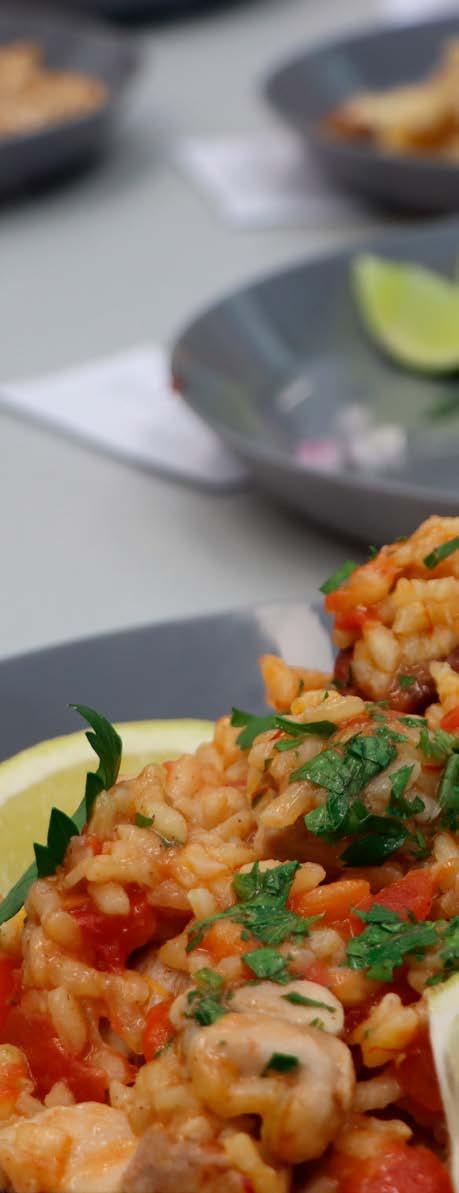

Unit 1
Explore how designers work across different areas of product design. You’ll learn about how designers research, generate ideas, and collaborate in teams. You’ll practise creative thinking and use both manual and digital drawing techniques to develop product concepts. You’ll also experiment with materials, tools, and processes to create prototypes. By analysing existing products and new technologies, you’ll learn how design briefs and the Double Diamond approach guide the design process. Safe and hands-on practical work helps you bring your ideas to life.
Unit 2
You’ll research the needs of a specific user and create an inclusive product that supports access, usability, and equity. You’ll also explore how culture influences design, including how Aboriginal and Torres Strait Islander peoples design with sustainability and tradition in mind. You’ll reflect on your own cultural background and how it can inspire meaningful, inclusive design solutions.
▪ Developing and conceptualising designs
▪ Generating, designing and producing
▪ Opportunities for positive impacts for end users
▪ Designing for positive impacts for end users
▪ Cultural influences on design
Unit 3
You’ll research a real-world need or opportunity and explore how designers respond to social, environmental, and economic challenges. Using the Double Diamond design process, you’ll generate ideas, test materials, and develop a final proof of concept. You’ll learn how to evaluate your designs using key product design factors and apply ethical research methods throughout your project. You’ll also explore how different design approaches like designing for longevity, reuse, or nature can influence your thinking.
Unit 4
Continue your journey as a designer. You’ll safely produce your final product using your chosen materials, tools, and processes. You’ll collect feedback, analyse your progress, and refine your work. You’ll also explore how design can shape the future by investigating emerging technologies, trends, and sustainable practices. By the end of this unit, you’ll evaluate your product and suggest improvements, considering how design can be innovative, ethical, and future-focused.
▪ Influences on design, development and production of products
▪ Investigating opportunities for ethical design and production
▪ Developing a final proof of concept for ethical production
▪ Managing production for ethical designs
▪ Evaluation and speculative design
There are no prerequisites for entry to Units 1 & 2.
Students must undertake Unit 3 & 4 as a sequence.
Unit 1 & 2
▪ Teachers’ decision that students have demonstrated achievement of a set of VCAA specified outcomes. Unit 3 & 4
▪ School-assessed coursework: 50%
▪ School-assessed Task: 20%
▪ Written examination: 30%
NEW IN 2026
Unit 1
In this unit, you’ll explore the core principles of engineering through the lens of mechanical systems -systems made up of moving parts and linkages. You’ll learn how these systems work by studying the physics and theory behind them, but the real focus is on designing and building your own.
Using the systems engineering process, you’ll create a working mechanical system, which may also include some basic electrical components. You’ll investigate how energy powers these systems and how it’s converted or used.
Along the way, you’ll be introduced to key mechanical engineering ideas like subsystems, motion, and simple physics and maths that help explain how things move and function.
Areas of Study
▪ Mechanical system design
▪ Producing and evaluating mechanical systems
Unit 2
In this unit, you’ll explore the core principles of electrotechnology - systems that use electrical and electronic circuits, including microelectronics. You’ll learn how these systems work through physics and theory, but the main focus is on designing and building your own.
Using the systems engineering process, you’ll create a working electrotechnological system, which may also include mechanical or electromechanical parts. You’ll investigate how energy powers these systems and how it’s controlled or converted. Electrotechnology is a fast-moving, creative field that’s constantly evolving with new innovations.
You’ll explore emerging technologies like microcontrollers and logic devices that are now common in modern electronics. Along the way, you’ll develop your understanding of electrical theory, learn how to read and use standard electronic symbols, and apply basic physics and maths to explain how circuits behave.
Areas of Study
▪ Electrotechnological systems design
▪ Producing and evaluating electrotechnological systems
There are no prerequisites for entry to Units 1 & 2.
Students must undertake Unit 3 & 4 as a sequence.
Unit 1 & 2
▪ Teachers’ decision that students have demonstrated achievement of a set of VCAA specified outcomes.
Unit 3 & 4
▪ Offered in 2027
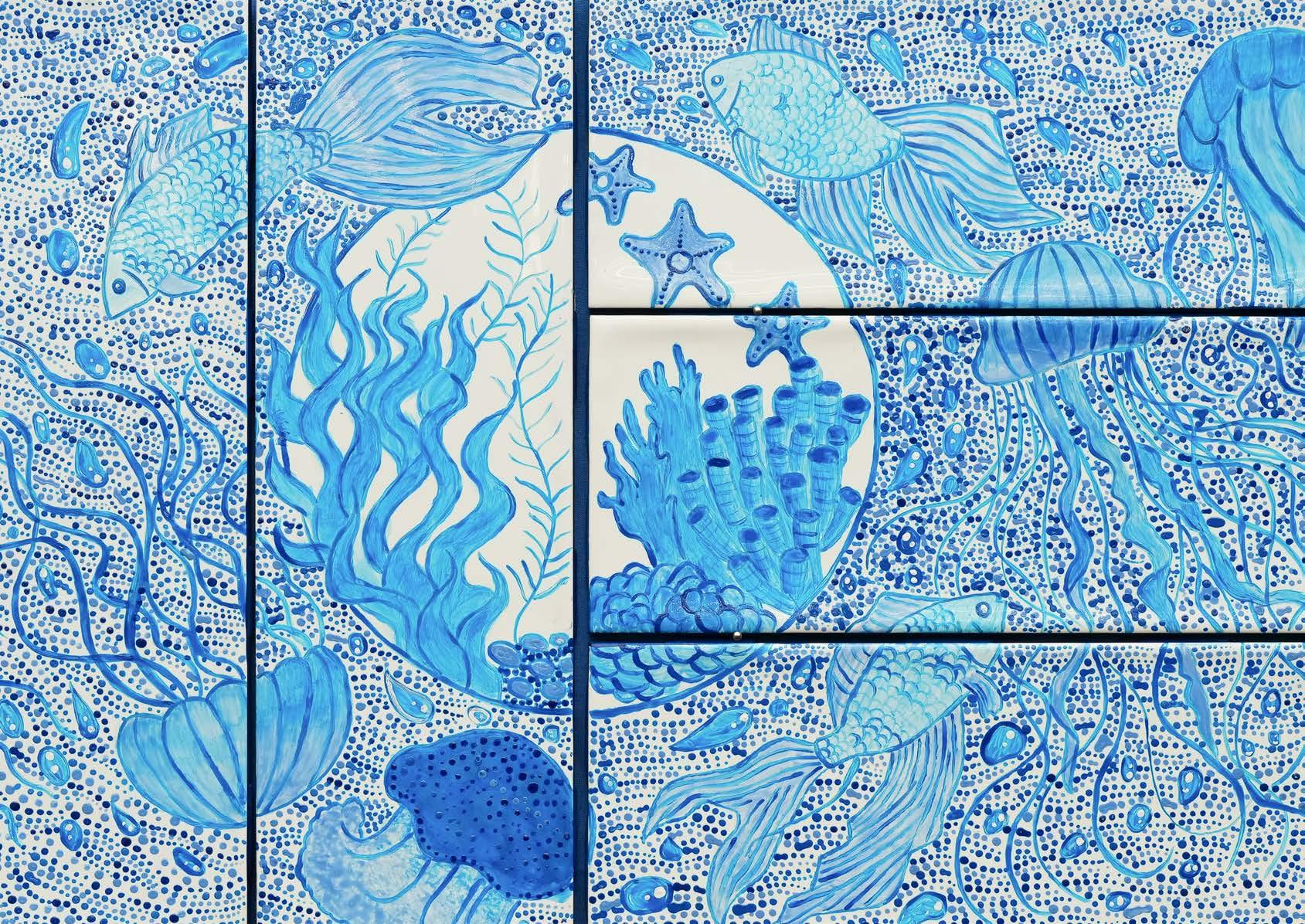
YEAR 10
SEMESTER BASED ELECTIVE
Explore how artists communicate ideas and meaning through their work. You’ll analyse how materials, techniques, and influences shape artworks, and use this knowledge to develop your own creative practice. You’ll experiment with different tools and processes to express your ideas and viewpoints.
You’ll also explore artworks and exhibitions from different cultures and time periods, including how audiences interpret them.
This course helps you think critically, create confidently, and understand art in a broader context.
► Your pathway to VCE Art Making & Exhibiting
YEAR 10
SEMESTER BASED ELECTIVE
Explore the world of contemporary design and visual communication. You’ll respond to creative briefs across environmental, industrial, and communication design fields, developing a folio that follows the six stages of the design process. You’ll build skills in drawing, design thinking, and digital tools like Adobe Illustrator, Photoshop, and SketchUp.
You’ll experiment with materials, methods, and media to bring your ideas to life through 2D and 3D presentations, while learning how to communicate visually with impact.
► Your pathway to VCE Visual Communication Design
YEAR 10
SEMESTER BASED ELECTIVE
In Filmmaking, you’ll dive into the world of visual storytelling learning how to plan, shoot, and edit your own films. You’ll experiment with cameras, lighting, and editing software while developing your creative voice.
Alongside hands-on projects, you’ll analyse films to understand how directors use techniques to tell powerful stories. From script to screen, you’ll explore how meaning is created and how audiences are engaged.
This course is perfect for anyone passionate about media, storytelling, or creative production.
► Your pathway to VCE Art Making & Exhibiting and VCE Media
YEAR 10
SEMESTER BASED ELECTIVE
You’ll learn how to use a DSLR camera and explore techniques like composition, lighting, and black-and-white photography.
You’ll capture portraits, landscapes, and creative shots while experimenting with light, shadow, and emotion. You’ll also learn basic editing and digital manipulation using Photoshop.
Throughout the course, you’ll build a digital folio and create a final online portfolio. You’ll even get the chance to print and display your best work in the Ngargee Centre!
► Your pathway to VCE Art Making & Exhibiting and VCE Media
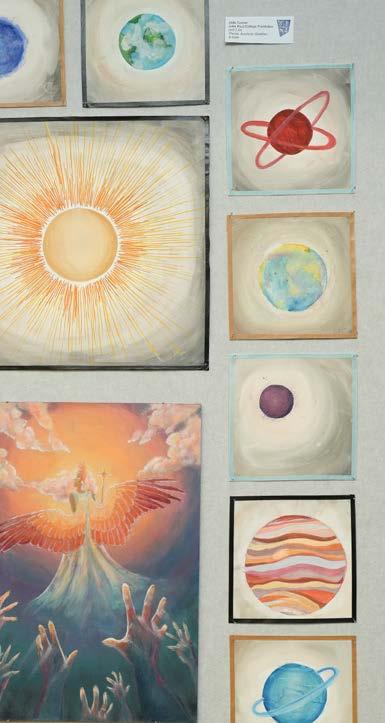
Unit 1
Discover a range of materials, techniques and processes used in different art forms. You’ll explore how materials behave, how artists use them, and how their use has changed over time. You’ll also learn how to handle materials safely. Through hands-on experimentation, you’ll generate ideas and develop your own artworks, documenting your creative process in a Visual Arts journal using both visual and written entries.
Unit 2
Understand how artists communicate ideas through aesthetic choices. You’ll respond to a set theme, develop your own ideas, and create a finished artwork. You’ll explore how art elements and principles are used to express emotion and meaning, and how artworks are displayed in exhibitions. You’ll also learn how exhibitions are planned and how artworks are selected and presented in different spaces, from galleries to site-specific locations.
▪ Explore – materials, techniques and art form
▪ Expand – make, present and reflect
▪ Investigate – research and present
▪ Understand – ideas, artworks and exhibition
▪ Develop – theme, aesthetic qualities and style
▪ Resolve – ideas, subject matter and style
Unit 3
You’ll explore materials, techniques and processes to develop your own artworks, using your Visual Arts journal to document your ideas, research, and experimentation. You’ll investigate how artists use visual language to express meaning and present a critique of your work to your peers to help refine your ideas. You’ll also visit at least one exhibition to gain inspiration and understand how artworks are displayed in different spaces.
4
Building on your work from Unit 3, you’ll refine and complete your artworks, continuing to document your progress in your Visual Arts journal. You’ll reflect on your creative decisions, evaluate your finished pieces, and explore how exhibitions are planned and artworks are cared for. You’ll visit a second exhibition space and consider how your own work could be presented. This unit helps you think like a professional artist, preparing your work for display and critique.
▪ Collect – inspirations, influences and images
▪ Extend – make, critique and reflect
▪ Connect – curate, design and propose
▪ Consolidate – refine and resolve
▪ Present – plan and critique
▪ Conserve – present and care
There are no prerequisites for entry to Units 1 & 2.
Students must undertake Unit 3 & 4 as a sequence.
Unit 1 & 2
▪ Teachers’ decision that students have demonstrated achievement of a set of VCAA specified outcomes. Unit 3 & 4
▪ School-assessed coursework: 70%
▪ Written examination: 30%
Unit 1
Explore how audiences interact with media and how meaning is created through media products. You’ll learn how media codes and conventions shape the way stories are told and how audiences interpret them. You’ll analyse how representations and narratives are constructed and how media creators influence what we see and understand. You’ll also create your own media work, experimenting with different forms and techniques to communicate meaning. Your work will reflect your understanding of how media shapes ideas and identity, including stories from Aboriginal and Torres Strait Islander creators.
Unit 2
You’ll focus on fictional and non-fictional narratives across traditional and digital media. You’ll explore how new technologies have changed the way stories are created and shared, and how audiences engage with them. You’ll design and produce your own media narratives, using codes and conventions to suit your chosen form, while analysing how media influences society and culture.
▪ Media representations
▪ Media forms in production
▪ Australian stories
▪ Narrative, style and genre
▪ Narratives in production
▪ Media and change
Unit 3
Explore how stories are told through media. You’ll closely analyse a media narrative like a film, series, or podcast and learn how codes and conventions shape meaning. You’ll explore how social, cultural, and political contexts influence both the creation of media and how audiences respond. You’ll begin planning your own media product by researching a media form that interests you, experimenting with technologies, and developing pre-production documents to guide your work in Unit 4.
Unit 4
This is where you bring your media product to life. You’ll complete the production and post-production stages, refining your work based on feedback and reflection. You’ll also explore how media products reflect and influence society by analysing values, views, and the role of media creators. You’ll consider how media is regulated and how audiences interact with it in today’s digital world. Throughout, you’ll document your process and prepare your work for presentation.
▪ Narratives and their contexts
▪ Research, development and experimentation
▪ Pre-production planning
▪ Media production
▪ Agency and control in the media
There are no prerequisites for entry to Units 1 & 2.
Students must undertake Unit 3 & 4 as a sequence.
Unit 1 & 2
▪ Teachers’ decision that students have demonstrated achievement of a set of VCAA specified outcomes.
Unit 3 & 4
▪ School-assessed coursework: 60%
▪ Written examination: 40%
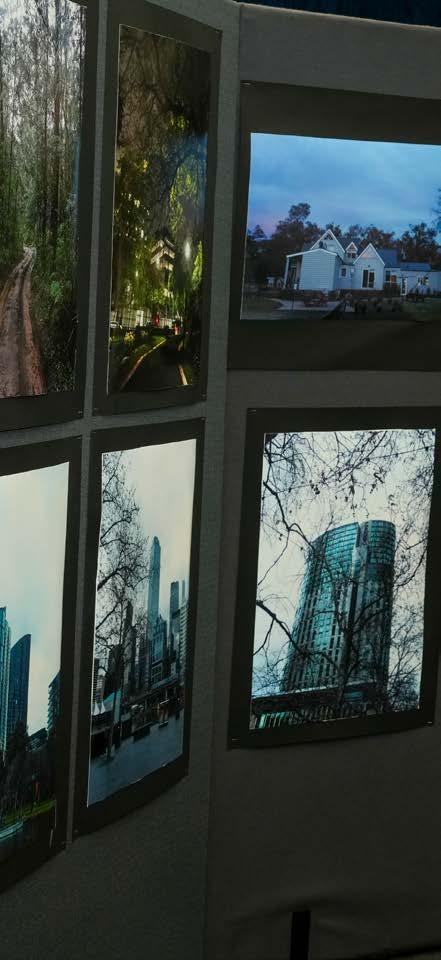
Unit 1
You’ll learn how design can improve life for individuals and communities, and how ideas of “good design” have changed over time. You’ll explore how to research with empathy, work in teams, and develop design briefs based on real needs. Using the VCD design process, you’ll experiment with materials, media and methods to create messages and objects. You’ll also explore brand strategy, product development and sustainable design, while learning how social, cultural and environmental factors shape design decisions.
Building on these skills, you’ll design environments and interactive experiences. You’ll explore fields like architecture, interior design and UX design, and learn how to create spaces and interfaces that respond to user needs. You’ll also study cultural design traditions, including Aboriginal and Torres Strait Islander practices, and learn about ethical design, intellectual property, and how design connects with time, place and identity.
▪ Reframing design problems
▪ Solving communication design problems
▪ Design’s influence and influences on design
▪ Design, place and time
▪ Cultural ownership and design
▪ Designing interactive experiences
Unit 3
Explore how designers work and how their ideas respond to real-world problems. You’ll study contemporary designers and learn how they use visual language, materials and processes to communicate ideas. You’ll also investigate how design is shaped by social, cultural and professional contexts. Using the VCD design process, you’ll research a design problem, write a brief, and develop ideas for two communication needs. You’ll experiment with different methods and media, share your work for feedback, and document your progress.
This is where you bring your design ideas to life. You’ll refine and complete your two design solutions, testing and improving them through feedback and reflection. You’ll explore how to present your work effectively, choosing the best materials and formats to communicate your ideas. You’ll also prepare a presentation to explain your design decisions and show how your work meets the needs outlined in your brief.
▪ Professional design practice
▪ Design analysis
▪ Design process: defining problems and developing ideas
▪ Design process: refining and resolving design concepts
▪ Presenting design solutions
There are no prerequisites for entry to Units 1 & 2.
Students must undertake Unit 3 & 4 as a sequence.
Unit 1 & 2
▪ Teachers’ decision that students have demonstrated achievement of a set of VCAA specified outcomes. Unit 3 & 4
▪ School-assessed coursework: 70%
▪ Written examination: 30%
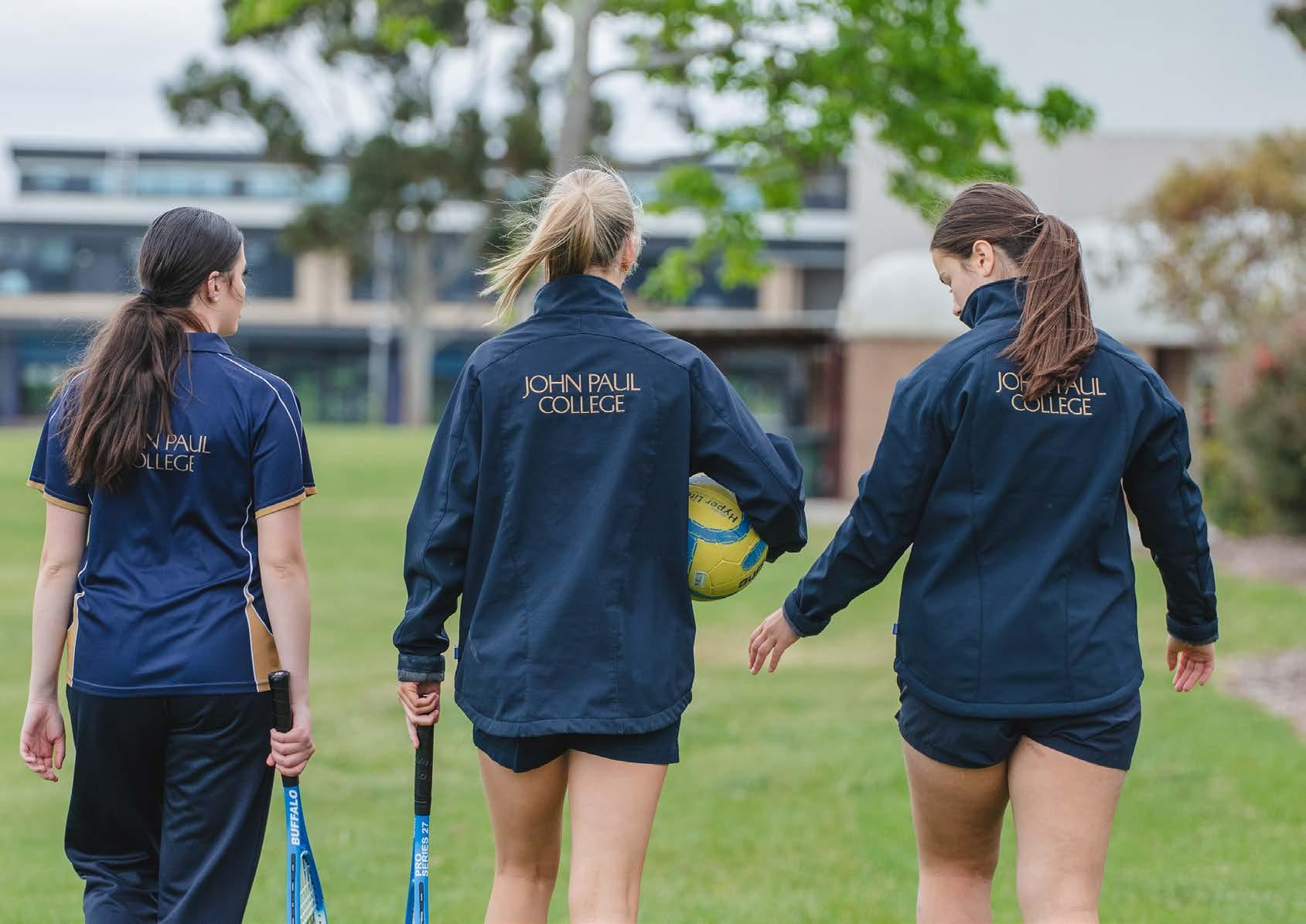
John Paul College in partnership with Chisholm Institute of TAFE and other providers, offers an exciting array of VET programs. VET gives you the opportunity to explore different career paths while you’re still at school. It’s also a great way to prepare for life after school, whether you’re thinking about going straight into a job, heading to TAFE, or even continuing on to university. By doing a VET course, you’re not just learning, you’re building experience and confidence that can help you take your next steps with purpose.
VET is all about learning real-world skills that you can actually use in a job. You’ll still be doing schoolwork, but you’ll also get hands-on experience in a workplace. It’s a great way to explore different careers while you’re still at school.
By completing a VET course, you can:
▪ Count it towards your VCE or VCE VM
▪ Gain credits that may contribute to your ATAR
▪ Prepare for further study at TAFE or university
▪ Get valuable workplace experience through structured work placement
Students enjoy VET because it lets them combine regular school subjects with practical training. It also gives them a chance to work directly with businesses and learn what it’s like in a real job.
At JPC, our VET programs are designed to help you get job-ready. Whether you want to go straight into work, head to TAFE, or even Uni, VET can help you get there. Plus, the qualifications you earn are recognised nationally. Employers know you’ve done real trainingeither through TAFE or on the job
When selecting a VET subject, you should think about:
▪ Your career goals or study plans
▪ How it fits with your other subjects
▪ Whether you’re ready for industry training
▪ Your motivation and independence
SWP is a key part of all VET programs. It helps you to:
▪ Apply your skills in real settings
▪ Learn directly from industry professionals
▪ Be assessed on your performance
▪ Boost your chances of getting a job
Work placements might happen weekly, during holidays, or in blocks—depending on the course.
Because VET options vary, students must discuss their choices with the JPC Careers Advisor or VET Coordinator before enrolling.
If you’re passionate about sport, fitness, or working with people, the VCE VET Sport and Recreation program is a fantastic opportunity to turn that passion into a career. This program gives you a strong foundation in the sport and recreation industry, combining classroom learning with hands-on experience.
You’ll explore topics like fitness instruction, event planning, customer service, and how to work safely and effectively in sport and recreation settings. You’ll also build essential skills in teamwork, communication, and leadership.
Throughout the course, you’ll take part in real-world projects and industry placements, giving you a taste of what it’s like to work in the field. You’ll learn how to support others in leading active, healthy lifestyles and understand the positive impact sport and recreation can have on communities.
On completion, you’ll have a nationally recognised qualification and a range of exciting pathways ahead. You might choose to work in a gym, leisure centre, sporting club, or community organisation. Roles could include fitness instructor, recreation officer, sports coach, or event assistant. Or, you might decide to continue your studies in areas like sports management, exercise science, or physical education.
Whether you’re aiming to enter the workforce or continue studying, this course is a great way to build confidence, gain practical experience, and take the first step toward a rewarding career in sport and recreation.
If you’re passionate about helping others and want to make a real difference in your community, the Cert III in Health Services Assistance is a great place to start. This program is designed for students who are interested in working alongside Allied Health Professionals (AHPs) in aged care, disability support, and other health-related areas.
Throughout the course, you’ll learn how to support AHPs under their supervision whether that’s face-to-face, indirectly, or even remotely. You’ll build practical skills in communication, patient care, and health service support, all while gaining a deeper understanding of how the healthcare system works.
A key part of the course is clinical placement. You’ll complete at least 120 hours of hands-on experience in a real healthcare setting. Most of this (at least 60%) will take place in an actual allied health workplace, giving you the chance to apply what you’ve learned in class to reallife situations. If needed, the rest can be completed in a simulated environment.
By the end of the program, you’ll be ready to take on a role as an Allied Health Assistant, supporting professionals in delivering high-quality care to patients across a range of settings. Whether you’re helping with rehabilitation, mobility, or daily living activities, your work will have a direct impact on people’s lives.
SKILLS, OUTCOMES & OPPORTUNITIES
▪ Two Year Program
▪ Nationally recognised Certificate III
▪ Option to receive ATAR contribution in Units 3 & 4
▪ Stepping stone to University & TAFE
▪ VCE Certificate
▪ Industry exposure and experience
Because VET options vary, students must discuss their choices with the Careers Advisor or VET Coordinator before enrolling.
NEW IN 2026
The VCE VET Business program gives you the opportunity to earn a nationally recognised Certificate III in Business, opening doors to a wide range of careers from administration to customer service and sales.
This two-year course is ideal whether you’re planning to enter the workforce or continue your studies. It includes scored assessment in Units 3 and 4, contributing to your VCE results while also preparing you with practical, realworld business skills.
You’ll gain confidence using digital technologies and business software, improving your digital literacy—an essential skill in today’s job market. The course also builds your ability to plan and prioritise tasks, work in teams, communicate professionally, and manage stress effectively.
In Year 1, you’ll focus on workplace safety, writing clear documents, teamwork, and sustainability. You’ll also complete an elective unit on personal wellbeing in the workplace.
In Year 2, you’ll develop time management, organise workplace information, and create professional business documents. You’ll also strengthen your communication and customer service skills, learning how to support clients and work efficiently in a business environment.
Whether you’re aiming for a business career or want to build transferable skills for any industry, VCE VET Business is a strong foundation for your future.
VET Dance is available to students in Years 10, 11, and 12. and is perfect for students who are passionate about dance and want to develop their skills while working towards their secondary school certificate. It combines practical dance training with theory, helping you build strong technique, creativity, and confidence.
The VCE VET Dance program comprises core units that prepare students to safely perform basic dance techniques, engage in physical fitness, add artistry to performance and build audition confidence.
You’ll study core units and choose electives in styles like ballet, jazz, street, tap, and lyrical dance. You’ll also explore life skills such as working with children, understanding employment contracts, and responding to feedback.
The program includes a minimum of three contact hours per week, with a mix of face-to-face classes and online learning.
You’ll develop transferable skills that can support a range of future pathways whether you want to pursue a career in dance or apply your skills in other creative or leadership roles.
To succeed in VET Dance, you’ll need commitment, creativity, and a willingness to work both independently and as part of a team.
Your learning will be hands-on, engaging, and focused on real-world skills that prepare you for further training or employment in the performing arts industry.
SKILLS, OUTCOMES & OPPORTUNITIES
▪ Two Year Program
▪ Nationally recognised Certificate III
▪ Option to receive ATAR contribution in Units 3 & 4
▪ Stepping stone to University & TAFE
▪ VCE Certificate
▪ Industry exposure and experience
Because VET options vary, students must discuss their choices with the Careers Advisor or VET Coordinator before enrolling.
If you enjoy working outdoors and learning hands-on, the VCE VET Horticulture could be the perfect fit for you. This two-year VET course provides a nationally recognised qualification that can lead straight into work or further training.
Throughout the course, you’ll gain practical skills in plant care, soil management, and landscape design. You’ll learn about developing and maintaining plants and landscapes, propagation, tending nursery plants and planting, pruning, treating weeds, pests and diseases.
Classes combine face-to-face practical training with online theory, giving you a well-rounded understanding of the horticulture industry.
You’ll be supported by experienced teachers in small class settings, ensuring you get the guidance and feedback you need to succeed.
This course is a great starting point if you’re interested in a career in landscaping, gardening, or nursery work. It also opens up opportunities for apprenticeships and further study in horticulture or related fields.
By the end of the course, you’ll have the confidence, skills, and knowledge to take your first steps into the horticulture industry or simply enjoy the satisfaction of learning how to create and care for green spaces.
▪ Two Year Program
▪ Nationally recognised Certificate III
▪ Option to receive ATAR contribution in Units 3 & 4
▪ Stepping stone to University & TAFE
▪ VCE Certificate
▪ Industry exposure and experience
Because VET options vary, students must discuss their choices with the Careers Advisor or VET Coordinator before enrolling.

The VCE Vocational Major (VCE VM) is a hands-on learning program that’s part of the VCE. It uses something called an “applied learning” approach, which means you’ll be learning by doing.
Applied learning is all about making your learning real and relevant, in a way that connects to your future goals. You’ll be learning in environments where you feel supported and respected, and where you can take control of your own learning journey.
It’s a great option if you enjoy practical tasks, want to build realworld skills, and are looking for a pathway into work, training, or further study after school.
The VCE Vocational Major, or VCE VM, is a two-year program that’s part of the VCE, but it’s designed for students who prefer hands-on, practical learning. It helps you build skills for work and life, while giving you real experience in one or more industries.
Your progress is assessed through classwork and activities your teacher will guide you through. The only exam you’ll need to do is Part A of the General Achievement Test (GAT).
To complete the VCE VM, you must successfully finish at least 16 units, including:
▪ Three VM Literacy or VCE English units (including a Unit 3–4 sequence)
▪ Three VM Numeracy or VCE Mathematics units (Foundations Mathematics or General Mathematics)
▪ Two VM Work Related Skills units
▪ Two VM Personal Development Skills units, and
▪ Two VET credits at Certifcate II level or above.
VCE and VET subjects are subject to availability / timetable constraints
VCE VM subjects are assessed differently from other VCE subjects. You won’t get a study score, and they don’t count towards an ATAR. But that’s okay, this program is perfect if you’re not aiming for an ATAR and would rather learn in a real-world setting.
VCE VM can set you up for lots of different pathways after school. You might go into an apprenticeship or traineeship, continue studying at TAFE or through an alternative university entry program, or even head straight into the workforce.
If you enjoy learning by doing and want to build skills that employers are looking for, VCE VM could be a great fit for you.
▪ Four core subjects
▪ Choice of one VCE subject
▪ Choice of VET subjects (Onsite or Offsite)
▪ Optional work placement
▪ GAT and SAC’s
▪ Pathway to University & TAFE
▪ VCE VM Certificate
▪ Five day onsite timetable
To complete the VCE VM, you need to successfully complete at least 16 units. This needs to include:
▪ Three VCE VM Literacy or VCE English units (including a Unit 3 and 4 sequence)
▪ Two VCE VM Numeracy or VCE Mathematics units
▪ Two VCE VM Work Related Skills units
▪ Two VCE VM Personal Development Skills units
▪ Three other Unit 3 and 4 sequences of your choice
▪ VET at a Certificate II level or above
You can add other VCE studies to your VCE VM program.
VCE VM LITERACY SKILLS
1 & 2
VCE VM NUMERACY SKILLS
1 & 2
VCE VM PERSONAL DEVELOPMENT SKILLS Units 1 & 2
VCE VM WORK RELATED SKILLS
1 & 2
STRUCTURED WORKPLACE LEARNING (Optional) VET COURSE (Onsite or Offsite)
RELIGIOUS EDUCATION (VET Community Service)
VCE VM LITERACY SKILLS
3 & 4
VCE VM NUMERACY SKILLS
3 & 4
VCE VM PERSONAL DEVELOPMENT SKILLS Units 3 & 4
VCE VM WORK RELATED SKILLS
3 & 4
STRUCTURED WORKPLACE LEARNING (Optional) VET COURSE (Onsite or Offsite)
RELIGIOUS EDUCATION (VET Community Service)
CORE VM SUBJECT
In Units 1 and 2, you’ll explore a wide range of texts including books, films, songs, and social media. You’ll learn how texts are shaped by purpose and audience, and how language influences opinions in everyday, workplace, and community settings.
In Units 3 and 4, you’ll explore real-world texts like safety reports, contracts, and workplace documents. You’ll learn how to understand, analyse, and create content that informs or influences others, building skills in communication, branding, and advocacy for yourself, a product, or a community group.
CORE VM SUBJECT
ExpIn Units 1 and 2, you’ll build practical maths skills to help you in everyday life, work, and the community. You’ll explore real-world problems, use technology, and learn how maths connects to your local and global environment.
In Units 3 and 4, you’ll build confidence using maths in real-life situations. You’ll explore more complex problems, use technology, and learn how to analyse and create practical texts like safety reports, contracts, and workplace documents to support your future goals.
CORE VM SUBJECT
In Units 1 and 2, you’ll explore personal identity, emotional intelligence, and how community and culture impact health and wellbeing. You’ll investigate local health organisations, design activities to support wellbeing, and learn how communication, technology, and teamwork can create positive change in your life and community.
In Units 3 and 4, you’ll build leadership and teamwork skills through real-world projects. You’ll explore community issues, plan and deliver a group response, and present your work to others. Along the way, you’ll develop confidence, communication, and problem-solving skills that prepare you for life beyond school.
In Units 1 and 2, you’ll explore future education and job options, research growing industries, and reflect on your own skills and goals. You’ll build resumes, write cover letters, and practise interview skills, getting ready to confidently plan your next steps and promote yourself in the workplace.
In Units 3 and 4, you’ll explore what makes a positive, inclusive workplace. You’ll learn about teamwork, communication, and workplace rights, then build a professional portfolio. You’ll also plan and present a community project, developing leadership, collaboration, and real-world skills for your future career.
Optional Structured Workplace Learning (SWL) is your chance to take what you learn in your VET course and apply it on the job. You’ll work one day a week in a real industry setting gaining hands-on experience and building your skills.
SWL is optional and it is your responsibility to find and secure your placement, and it must meet Department of Education and Training guidelines. Our VET and VCE VM Coordinator will support you if you need help finding a placement.
Securing your SWL placement is also part of your assessment in the Work Related Skills (WRS) strand, so it’s important to get started early and show initiative.
In this subject, you’ll combine your learning about faith and values with real-world community service. You’ll explore how religious teachings connect to everyday life and discover how compassion, empathy, and social responsibility can shape your actions.
Through hands-on service projects, you’ll support your local community while building valuable skills in leadership, teamwork, and communication. This course helps you grow personally and spiritually, while preparing you for future roles in community support, outreach, or care-based careers.
It’s a meaningful way to live out your values and make a positive impact on the world around you.
88 John Paul College
The Victorian Pathways Certificate (VPC) is a flexible and inclusive option for students in Years 11 and 12 who benefit from a more personalised learning experience. It’s designed to support students who may need extra time, different learning approaches, or a program that better suits their individual goals.
The VPC can be a final qualification or a stepping stone into the VCE, VCE Vocational Major (VM), a VET course, or employment.
You can start the VPC at any time during the school year, and the time you take to complete it is flexible.
Your Pastoral teacher or careers advisor will work with you and your family to decide if the VPC is the right fit.
Our careers advisor will help you design a program that works for you.
To achieve your VPC you must complete a minimum of 12 units, including
▪ VPC Literacy
▪ VPC Numeracy
▪ VPC Work Related Skills
▪ VPC Personal Development Skills.
You can also include VCE, VCE VM, or VET units (Certificate I or above) to tailor your program to your interests and goals. We’ll help you design a program that supports your learning and prepares you for what’s next.
▪ Victorian Pathways Certificate
▪ Pathway to further study or vocational training
▪ Flexible learning and assessment

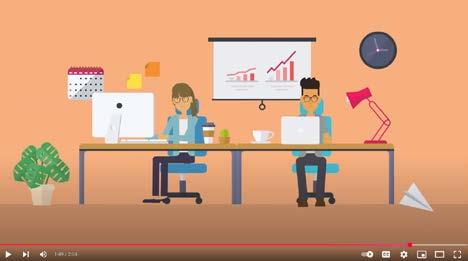


• Access the Careers Hub via SIMON > Community
• Explore information on future study, finding work, and career pathways
• Stay Connected — Visit the Connect with Us tab for careers department details and to book a meeting with a Careers Advisor
• Stay Informed — Find Career Newsletters in Important Files, updated fortnightly with the latest university, TAFE, and course information. Your one-stop destination for all things careers! Knowledge is Power Stay
